Welcome to Essential Politics, our daily feed on California government and politics news. Here’s what we’re watching:
- Legislators sent Gov. Jerry Brown a sweeping package of gun violence measures on Thursday, efforts to impose new rules on everything from buying ammunition to reporting stolen or lost firearms.
- An initiative to overhaul prison parole earned a spot on the crowded Nov. 8 ballot on Thursday, as did an effort to speed up death penalty cases.
- Rep. Xavier Becerra and other California House members hosted a gun control discussion Wednesday at Los Angeles City Hall.
- Assemblymembers will consider a resolution asking Gov. Jerry Brown to declare a statewide homelessness emergency.
You can find our earlier coverage of the June 7 California primary here. Be sure to follow us on Twitter for more, or subscribe to our free daily newsletter and the California Politics Podcast
- Share via
Southern California lawmakers homeward bound after wrapping up work in Sacramento
- Share via
Gov. Jerry Brown’s plan to revamp prison parole rules qualifies for the November ballot
California voters will consider expanded opportunities for state prisoners to be paroled under Gov. Jerry Brown’s initiative that qualified for the fall ballot on Thursday.
Brown, who unveiled his proposal at the end of January and successfully fought back a legal challenge that he had waited too late, has insisted the proposal is both an important fix to sentencing laws he helped loosen in 1977 and necessary to help the state comply with federal court orders to shrink the prison population.
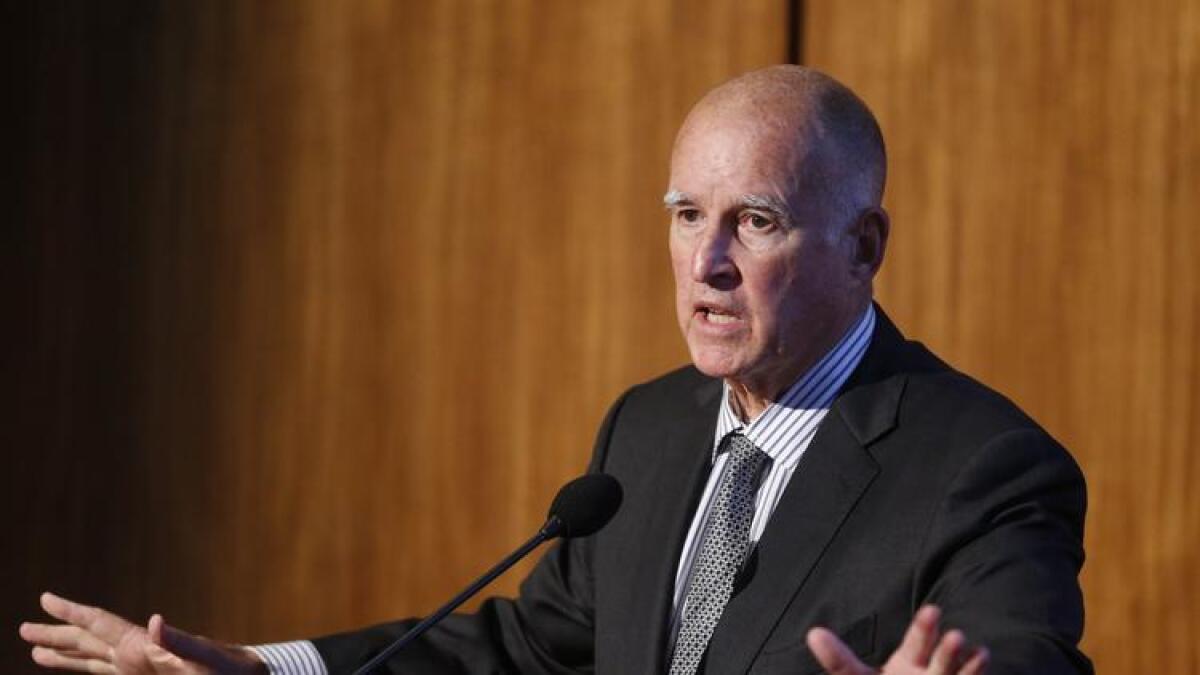
“If approved by the voters, this Public Safety Act will prevent court ordered inmate releases, encourage rehabilitation, and make California safer,” said the governor in a written statement on Thursday.
The initiative, an amendment to the state Constitution, would allow some prisoners serving time for a nonviolent crime to be eligible for early release based on their ability to earn credits for education efforts and good behavior while behind bars.
“Let’s take the basic structure of our criminal law and say, when you’ve served fully the primary sentence, you can be considered for parole,” Brown said when unveiling the proposal in January.
The ballot measure would also eliminate the existing law that sends some juvenile offenders immediately to an adult court hearing.
Brown hinted in a spring campaign fundraising email that the initiative is essential in preventing court-ordered prisoner releases to ease overcrowding.
The initiative was in danger of being blocked by a legal challenge, with district attorneys arguing that Brown had waited too late. The state Supreme Court rejected that challenge earlier this month.
Update 4:15 pm: This story has been updated to include a statement from Gov. Brown.
- Share via
Voters will weigh extension of temporary taxes on California’s wealthy taxpayers in November
An initiative to add 12 years to the life of temporary income tax rates on Californians earning above $250,000 a year secured a place on the Nov. 8 statewide ballot on Thursday.
The proposal, championed by a coalition of education and healthcare groups, seeks to extend the income tax provisions in 2012’s Proposition 30. Those taxes are set to expire in 2018.
The independent Legislative Analyst’s Office estimates the tax initiative will bring in at least $5 billion a year. Last month, budget advisors to Gov. Jerry Brown estimated the proposal could be the difference between small budget surpluses or multimillion-dollar deficits two years from now.
Brown, who led the campaign to pass Prop. 30, has not officially endorsed the new tax measure. But it was his insistence that forced the initiative’s backers to revise their plan in January so that a portion of the tax revenues would be placed in the state’s newly expanded rainy-day fund.
- Share via
President Obama signs two bills backed by California lawmakers
- Share via
What will Gov. Jerry Brown do on gun control bills?
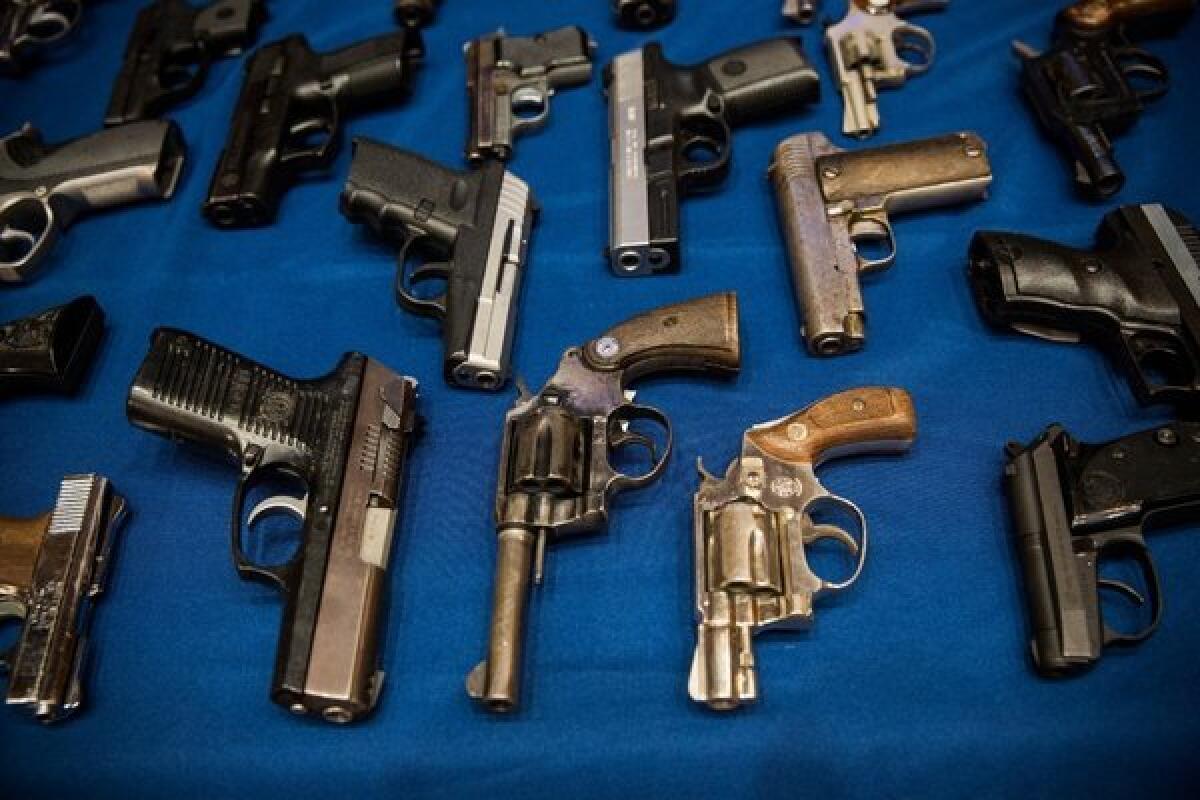
California lawmakers sent new gun control legislation to Gov. Jerry Brown’s desk on Thursday, including a measure to make it easier to confiscate weapons from someone a court deemed dangerous.
Reporters asked the governor whether he would sign or veto the bills as he left an event outside the Capitol.
His answer?
“I’ve got to look at them.”
- Share via
California lawmakers pass unprecedented package of gun control bills
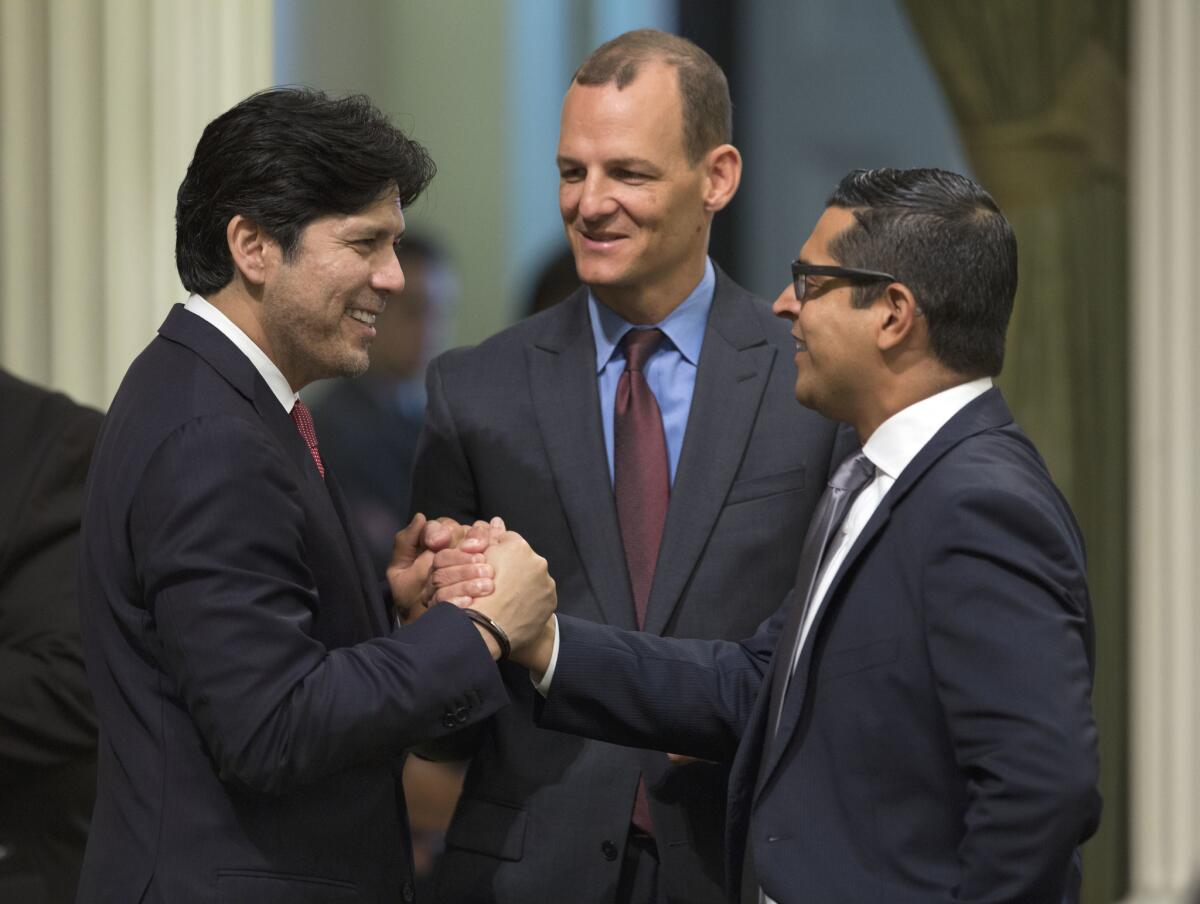
Spurred by outrage over recent mass shootings, California lawmakers on Thursday sent Gov. Jerry Brown a sweeping package of gun control bills, including a ban on the sale of semi-automatic rifles with detachable magazines, background checks for those buying ammunition and new restrictions on homemade firearms.
The flood of bills was introduced in response to the December terrorist attack in San Bernardino that killed 14 people at a holiday party, but momentum for action swelled after the June 12 mass shooting at an Orlando, Fla., nightclub that killed 49 people.
“The killer sprayed that nightclub with bullets,” Senate President Pro Tem Kevin de León (D-Los Angeles) said during the floor debate Thursday. “How could someone filled with so much hate have such easy access to ammunition?”
Among the bills the Senate sent the governor was a measure from De León that would require ammunition buyers to show an ID and have their name checked against a list of felons and others prohibited from having firearms.
Most Republicans voted against that bill and others. Republican Sen. Jim Nielsen of Gerber said the measures would hinder citizens who obey the laws and would be ignored by criminals.
“Gun violence is not committed by law-abiding citizens, it is committed by criminals,” Nielsen said during the floor debate.
The measures were expedited to the governor’s desk Thursday in hopes that he might act on them immediately.
Legislators hope to convince Lt. Gov. Gavin Newsom to drop an initiative that has qualified for the November ballot that contains many of the same provisions in the gun bills approved Thursday. Newsom has indicated he has no plans to drop his ballot measure by Thursday’s deadline, saying his proposal goes further in controlling firearms.
California already has some of the toughest gun control laws in the nation, including a ban on assault rifles, but lawmakers said the new bills were meant to plug loopholes exploited by gun manufacturers and owners.
The bills sent to the governor include:
Ammunition sales: Requires an ID and background check to purchase ammunition and creates a new state database of ammunition owners
Large ammunition clips: Bans possession of ammunition magazines that hold more than 10 bullets.
Bullet buttons: Two proposals would strengthen California’s assault weapon law by outlawing a small buttonhole used for quickly swapping out ammunition magazines
Limit on gun loans: A new restriction on loaning guns without background checks.
Stolen gun reporting: Stolen or lost guns would have to reported within five days.
False gun reporting: A new punishment for falsely reporting guns as stolen
Ghost guns: Homemade “ghost guns” would need to be registered and there would be new limits on selling them
Long gun limits: Only one rifle or shotgun could be purchased per month
Gun research: Urges Congress to lift the prohibition against publicly funded scientific research on the causes of gun violence and its effects on public health
Gun restraining orders: Bans a person subject to a “gun violence restraining order” from having any firearms or ammunition while the order is in effect
Gun theft: Clarifies that theft of a firearm is grand theft and is punishable as a felony
- Share via
Low-income housing bond still alive for November ballot
The author of a $3-billion proposal to build low-income housing statewide still wants the measure to appear before voters in November, even though it won’t meet the deadline for getting issues on the ballot.
The measure from Sen. Jim Beall (D-San Jose) has passed the Senate but now is in the Assembly Appropriations Committee awaiting action before would reach the Assembly floor. It requires a two-thirds vote to pass as well as the signature of Gov. Jerry Brown before it goes before voters.
Beall is aiming to get the measure approved by the Assembly committee prior to the Aug. 12 deadline for fiscal legislation, according to his office. Lawmakers have routinely bypassed normal election deadlines in years past to add proposals to the fall ballot late into the summer.
The bond would pay for new housing construction — specifically for development near transit and in high-density urban areas — and provide housing for farmworkers and mortgage assistance.
- Share via
Lawmakers give final approval to a $2-billion bond to help house the homeless
A bipartisan group of legislators sent Gov. Jerry Brown a $2-billion bond measure on Thursday that would provide housing for the homeless who suffer from mental illness.
The proposal, part of a plan unveiled by Senate Democrats in January, would fund new and refurbished housing in communities across California. The bonds will be repaid with proceeds from a tax on incomes above $1 million, approved by voters in 2004 to fund mental health programs.
“Republicans and Democrats alike recognize that finding permanent supportive housing for the chronically homeless suffering from mental illness will improve the quality of life in our communities and give hope to thousands of Californians,” said Senate leader Kevin de León (D-Los Angeles) in a statement.
The proposal, part of the new state budget deal, earned bipartisan support after GOP demands for a separate effort to boost funding for helping homeless veterans and youth.
“We also fought to create more oversight and accountability in how funds to serve the state’s mentally ill population are spent,” said Assembly GOP leader Chad Mayes (R-Yucca Valley) in a statement.
Brown is expected to sign the bond proposal into law.
- Share via
Bill sent to governor requires background checks on ammunition buyers
- Share via
Lawmakers send governor bill to expand seizure of guns from persons judged dangerous

State lawmakers on Thursday sent the governor a bill that would significantly expand a law that allows certain people to petition to the courts to confiscate guns from persons deemed to be dangerous.
Part of a large batch of gun-control measures expected to be acted on Thursday by the Legislature, the “gun violence restraining order” bill was given final legislative approval by the Senate after a debate in which supporters invoked the mass shootings in Orlando, Fla., and San Bernardino and Isla Vista.
The Isla Vista incident in 2014, in which a disturbed man killed six UC Santa Barbara students and wounded 13 others, resulted in a law that took effect in January that allows the police and family members to petition a court for a “gun violence restraining order,” removing firearms from persons they believe are dangerous for up to one year.
The Isla Vista shooter’s family tried unsuccessfully to alert authorities about his troubling behavior before the incident.
In Orlando, where a gunman killed 49 people this month, co-workers of the killer told authorities beforehand that they were concerned he might be a public danger after he bragged of being part of Hezbollah and said he hoped to die as a martyr when police raided his apartment.
The bill sent to the governor Thursday expands the list of those who can petition for restraining orders to include co-workers, employers, mental health professionals and employees of high schools and colleges.
Those people, according to state Sen. Hannah Beth Jackson (D-Santa Barbara), “are the most likely to see early warning signs when someone is becoming a danger to themselves or others.”
She said 30 restraining orders have been issued under the current law.
“This is trying to prevent a tragedy from happening,” she said.
Republican Sen. Jim Nielsen of Gerber voted with other Republicans against the bill, saying it could lead to disgruntled co-workers reporting each other.
“This goes a little too far,” Nielsen said.
The order to remove guns from an individual can be appealed by the individual who is targeted. So far this year, Los Angeles County reports seven “gun violence restraining orders” have been issued.
The NRA and other gun-owner rights groups are joined in opposing the measure by the American Civil Liberties Union of California, which said in a letter to lawmakers that the bill “creates significant potential for civil rights violations.”
Co-workers with an irrational fear may target a fellow employee without cause, and the bill lacks sufficient due process protections, the ACLU warned.
“An ex-parte order means the person subjected to the restraining order is not informed of the court proceeding and therefore has no opportunity to appear to contest the allegations,” the group wrote.
Meanwhile, legislative leaders including Senate President Pro Tem Kevin De León (D-Los Angeles) have requested that Lt. Gov. Gavin Newsom drop an initiative that has qualified for the November ballot that has many of the same gun laws proposed in legislation.
If the initiative passes, its provisions would supersede new laws approved by the Legislature where they overlap.
A squabble has erupted between the De León and Newsom camps over the Senate leader’s decision to amend one of his bills that would require those buying ammunition to show identification so a seller can check that if that person is on a list of felons and others prohibited from possessing firearms.
Under the amendment, De León’s ammo bill would become law instead of a similar provision in the initiative.
Dan Newman, a political consultant for the Newsom initiative, said the change jeopardizes attempts to toughen the law.
“It raises a slew of legal questions which risk giving the NRA the chance to thwart progress by tying it up in the courts,” Newman said.
Dan Reeves, the chief of staff for De León, said the legislation is a better proposal.
“The amendment is designed to ensure a smoother implementation of background checks for ammunition purchases that is less burdensome to gun owners and will cost taxpayers half as much,” Reeves said.
- Share via
National Democrats hope to connect Republican in heavily Latino district to Donald Trump
The Democratic Congressional Campaign Committee is forging ahead with efforts to link Rep. David Valadao (R-Hanford) with Donald Trump’s rhetoric, despite the congressman’s announcement last week that he won’t back the presumptive Republican presidential nominee.
“The only thing that has changed is that David Valadao has exposed himself as a say-anything politician in deep trouble,” committee spokeswoman Barb Solish said in a statement. “Valadao’s words are too little, too late. Running from Trump is no longer an option, and Valadao must accept the reality that he is on the Trump ticket.”
Democrats have targeted Valadao’s heavily Latino Central Valley district as a potential pickup opportunity in the fall.
Valadao avoided talking about the presidential race for months, saying he would support the eventual nominee.
But in a statement released by his campaign Thursday, Valadao said he can’t support Trump and he won’t back presumptive Democratic nominee Hillary Clinton either.
He cited concerns with Trump’s understanding of foreign policy and the legislative process in an interview with KBAK-TV in Bakersfield.
It isn’t yet clear whether Valadao will face Emilio Jesus Huerta or Daniel Parra in the fall. As of Thursday morning, Huerta led by 1,117 votes.
- Share via
Voters will consider a new use for bag fees on November ballot
California voters in November will not only decide whether to uphold the state’s plastic bag ban, but will also whether to redirect fees on paper and reusable bags to environmental projects.
Secretary of State Alex Padilla on Wednesday announced that a bag fee initiative, backed by the plastic bag industry, has qualified for the Nov. 8 statewide ballot.
The American Progressive Bag Alliance submitted nearly 600,000 signatures in favor of the initiative after it gathered more than 800,000 signatures on petitions for a referendum on the statewide bag ban.
The bag ban law “has never been about protecting the environment,” Lee Califf, executive director of the bag alliance, said in a prepared statement. “This measure gives voters the opportunity to make sure that any state-mandated fee will go to environmental causes, which is what voters thought they were getting in the first place.”
The ballot measure would require stores to deposit their bag sale proceeds into a special fund administered by the Wildlife Conservation Board. It would mandate the board develop regulations to implement the law.
An analysis by the independent Legislative Analyst’s Office has estimated that revenue redirected from retailers to environmental efforts could total tens of millions of dollars annually.
If the referendum is successful in stopping the statewide ban on single-use bags, then the initiative would only impact bag fees in communities with local bans in place.
- Share via
Initiative to speed up the death penalty process qualifies for the November ballot
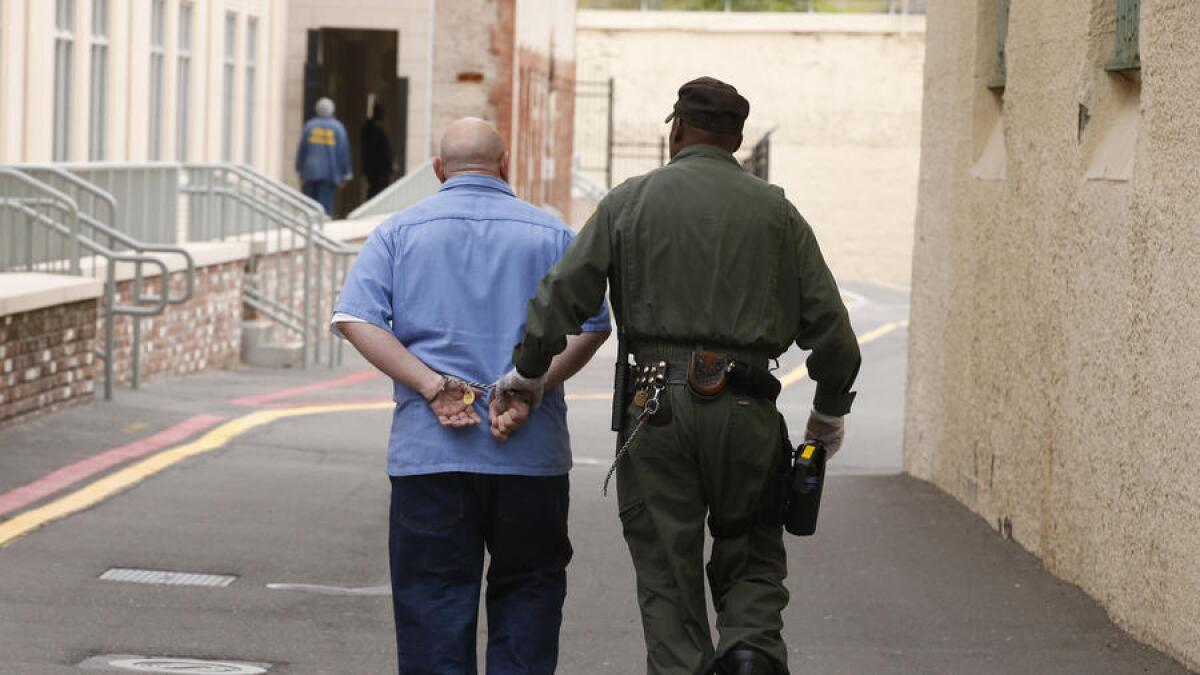
An initiative that aims to speed up executions in California qualified for the Nov. 8 ballot on Thursday, making it one of two competing measures voters will weigh on the death penalty.
The Secretary of State’s Office said it was able to verify a random sample of signatures among the more than 593,000 collected.
Sacramento County District Attorney Anne Marie Schubert, co-chair of the Californians for Death Penalty Reform and Savings Campaign, called it an important day for public safety and said the organization would work to kill the opposing ballot measure.
“Death row killers earned their sentences recommended by juries and imposed by judges across California,” Schubert said. “Justice demands that those sentences be carried out. These killers should not be rewarded by repealing the death penalty.”
Both capital punishment ballot measures would require current death row inmates to work and pay restitution to victims. One measure would keep the death penalty, while the other would replace it with life without parole.
The pro-death-penalty initiative limits the number of petitions prisoners can file to challenge their convictions and sentences, and would provide new deadlines intended to expedite appeals.
It requires attorneys appointed to the cases of indigent defendants who take non-capital appeals to accept death penalty appeals, and it exempts prison officials from the state’s regulatory process for developing execution drugs.
Death penalty supporters say the measure would reform a broken system, reducing the time from conviction to execution from as long as 30 years to 10 to 15 years.
The independent Legislative Analyst’s Office has estimated that the initiative could potentially provide the state tens of millions of dollars annually in correctional savings. But it could cost the state just as much annually for appeals proceedings over a period of several years, and its fiscal impact on such court expenses in the longer run is unknown.
UPDATE 6:20 p.m. This story has been updated with additional information.
- Share via
California House Republicans ask President Obama to halt benefits for immigrants in the U.S. illegally
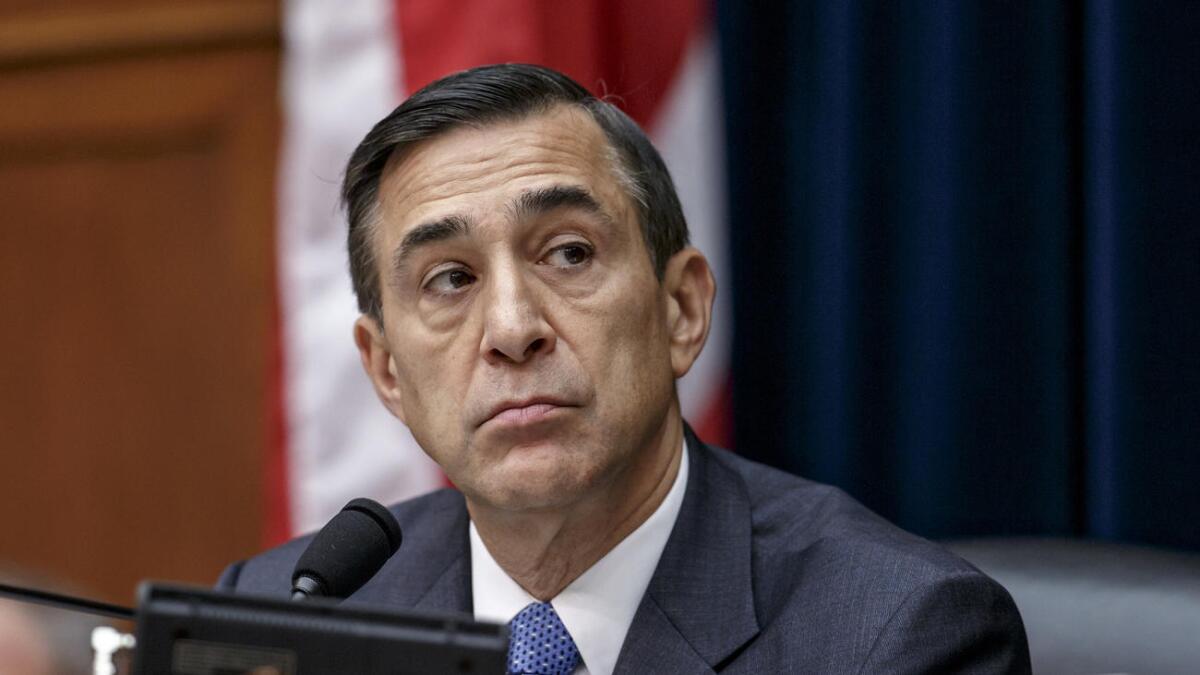
Nine California Republican House members are asking the Obama administration to reject California’s application to extend benefits under the 2010 Patient Protection and Affordable Care Act to those in the country illegally.
Earlier this month, Gov. Jerry Brown signed a bill to make California the first state to ask federal officials to allow immigrants in the U.S. illegally to buy insurance through its state health exchange. Under SB 10, the state will formally ask the federal government to allow those in the U.S. illegally to buy insurance through Covered California, without cost to the state or federal government.
The House members’ letter to Health and Human Services Secretary Sylvia Burwell and Treasury Secretary Jacob Lew was released Wednesday.
“This brazen attempt to circumvent the will of Congress adds insult to injury for the millions of Americans who have already been aggravated and misled by the Patient Protection and Affordable Care Act,” the letter states.
The letter also points to a 2009 address Obama made to a joint session of Congress.
“There are those who claim that our reform effort will insure illegal immigrants. This too is false,” Obama said in the speech. “The reforms I’m proposing would not apply to those who are here illegally.”
The Affordable Care Act explicitly prohibits people from purchasing coverage through a state insurance exchange if they aren’t legal residents.
Rep. Darrell Issa (R-Vista) said in a statement the letter is about keeping those commitments.
“When this disaster of a law passed, the American people were told under no uncertain terms that coverage under Obamacare would not be extended to illegal immigrants,” he said. “Yet here we are six years later and the state of California is already trying to wipe away this promise.”
- Share via
Rep. Maxine Waters slams House Speaker Paul Ryan at L.A. gun control event: ‘He’s spineless’
- Share via
Rep. Xavier Becerra hosts gun control discussion at L.A. City Hall
- Share via
Billionaire Tom Steyer won’t decide whether to run for governor until after November
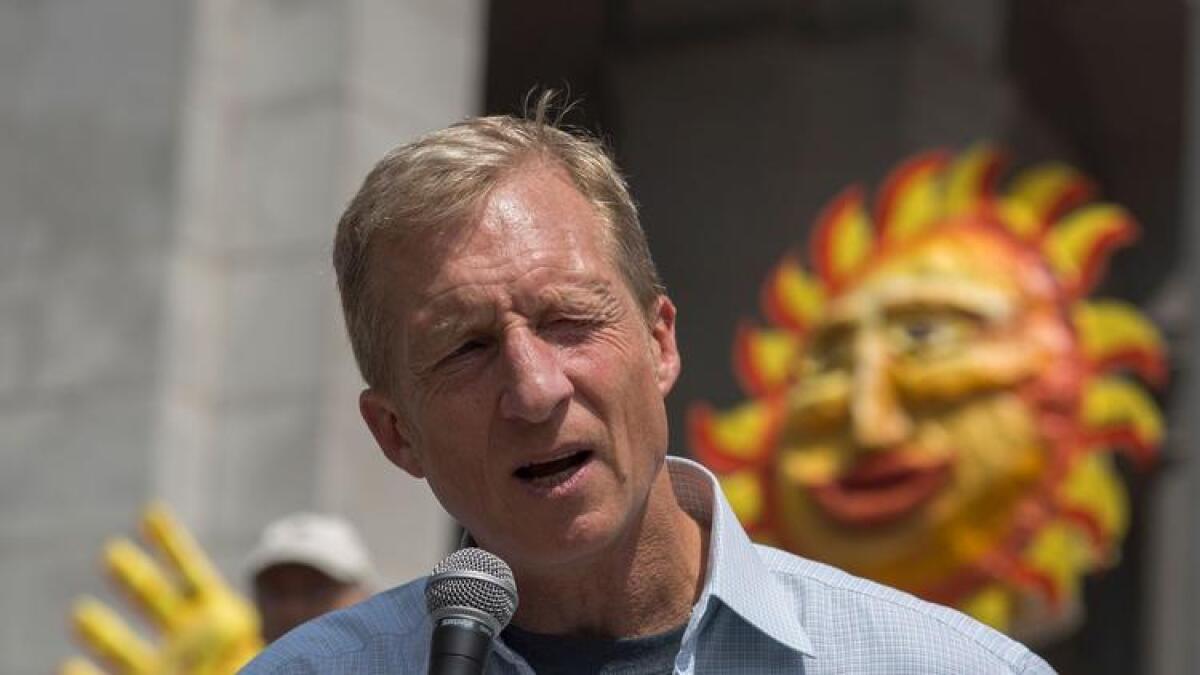
As he attended a Capitol rally Wednesday with the head of the United Farm Workers and later gave a speech to the Harry S. Truman Democratic Club, billionaire environmentalist Tom Steyer looked very much like a candidate running for office.
But the former hedge fund manager hedged when asked when he will decide whether to run for governor of California.
“I am completely committed between now and Nov. 8 to working for a great Democratic victory, and after that I will figure out what the best way is to keep pushing the same values we are pushing this year,” Steyer told The Times in an interview before the UFW event.
At the event, UFW President Arturo Rodriguez praised Steyer for donating thousands of large bottles of water to pickers working in California’s fields during this year’s hot harvest, and both men called for agricultural businesses to abide by tough new rules to protect farm workers from overexposure to the sun.
Steyer was scheduled later to give a speech to the Democratic club on his “vision for California.”
His frequent public appearances have many speculating that he will run for governor in 2018. Lt. Gov. Gavin Newsom is the only high-profile candidate who has already declared his candidacy for governor.
Steyer has spent about $700,000 to help register Democratic voters for this year’s elections and contributed $1 million to help get a measure on the November ballot that would raise the tobacco tax in California.
“We know what we believe in and what we are fighting for. but the right way to take on that fight at any one time I honestly don’t know,” he said. “There’s a lot of water to flow under the bridge before I make a decision about what is the right thing to do after November.”
- Share via
State lawmakers still at a stalemate on police transparency rules
California lawmakers have reached a stalemate over how much the public should know about the official activities of police officers.
All but one of this year’s major bills dealing with access to police records are now dead, leaving the state’s strong limitations against releasing law enforcement information in tact.
- Share via
Initiative to legalize recreational pot use qualifies for November California ballot

An initiative that would legalize the recreational use of marijuana in California officially qualified for the Nov. 8 ballot on Tuesday as the campaign for the measure has taken a commanding lead in fundraising for the battle ahead with opponents.
The Secretary of State’s Office certified that a random sample found sufficient signatures among the 600,000 turned in by a coalition that includes former Facebook President Sean Parker and Lt. Gov. Gavin Newsom.
“We think voters in California are ready to end marijuana prohibition and replace it with a more sensible system,” said Mason Tvert, a spokesman for the Marijuana Policy Project, which has about 200,000 supporters nationwide.
The initiative would allow adults ages 21 and older to possess, transport and use up to an ounce of cannabis for recreational purposes and would allow individuals to grow as many as six plants.
More than $3.7 million has been raised so far by the leading campaign for the initiative, Californians to Control, Regulate and Tax Adult Use of Marijuana While Protecting Children.
The opposition campaign, which argues it is bad for public safety, has raised about $125,000 so far from groups including the Assn. of Los Angeles Deputy Sheriffs State PAC and the Los Angeles County Professional Peace Officers Assn.
- Share via
Healthcare workers union is withdrawing its November initiative on hospital CEO salaries
Four days after losing a court battle with hospitals, leaders of California’s healthcare workers union decided Tuesday to abandon a ballot measure that would limit the annual compensation of hospital executives.
The executive board of the Service Employees International Union-United Healthcare Workers will now ask to have almost 650,000 voter signatures set aside on the initiative to limit CEO pay at nonprofit hospitals.
“This is only a short-term delay,” said Steve Trossman, a spokesman for SEIU-UHW. “We’re going to be coming back in 2018.”
On Friday, a Sacramento judge agreed with an arbitrator that the union had violated what amounted to a peace pact with the California Hospitals Assn. when it filed the initiative in late 2015.
Based on preliminary data from county elections officials, the initiative was on its way to qualifying for the Nov. 8 ballot. Thursday is the deadline for the checking of signatures on all initiatives to be completed.
- Share via
U.S. Rep. Loretta Sanchez: Extended trip to Spain was ‘on my own dime’
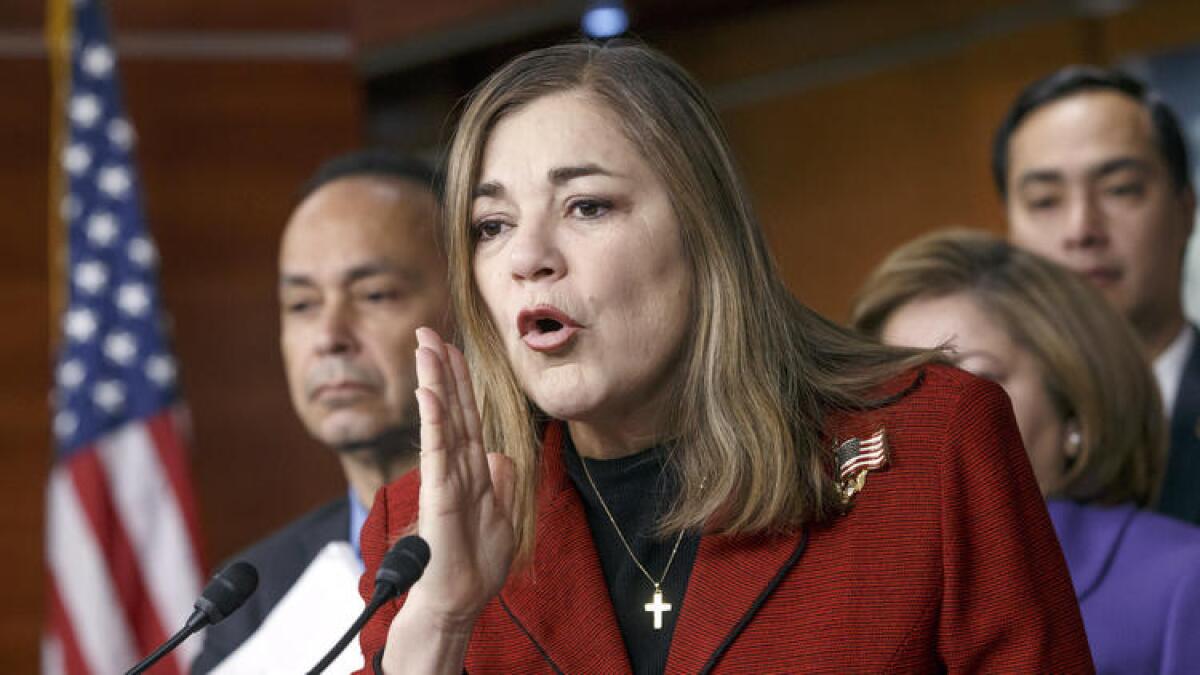
As dozens of House Democrats staged a 25-hour sit-in on Capitol Hill last week to demand votes on gun control legislation, all but one Democratic House member from California joined in.
Rep. Loretta Sanchez (D-Orange) was unable to participate because she was in Spain after a two-day trade mission there, her representative said. Sanchez extended her stay after the trade mission by six days.
At a campaign event in Santa Monica on Tuesday to discuss education policy, Sanchez responded to questions about her absence from the sit-in, saying there wasn’t much she could do while out of the country once she found out about the action.
“The sit-in was very organic, and it just happened on Wednesday night,” Sanchez said. “I took the first flight available from Spain.”
Sanchez flew out of Spain that Thursday morning.
Initially, Sanchez’s aides told The Times she was unable to participate in the sit-in because she was out of the country for the trade mission. But the trade mission ended June 17, six days before Sanchez left Europe.
Her staff later said Sanchez was meeting with officials in Gibraltar about trade and the “Brexit” vote, and took a personal day.
“That was all on my own dime, by the way,” Sanchez said Tuesday, adding that her husband also paid his way to accompany her on the trip.
Sanchez said her meetings with officials, including the commandant and chief minister of Gibraltar, occurred after the trade mission.
“I like to go and talk to leaders, especially when they’re asking to talk to us without the State Department,” she said.
Luis Vizcaino, a Sanchez U.S. Senate campaign spokesman, said afterward that any suggestion that Sanchez’s absence from the sit-in indicates a lack of commitment to stricter gun controls is “outrageous.”
He pointed to a 2015 report from the state auditor that state Atty. Gen. Kamala Harris, Sanchez’s opponent for U.S. Senate, failed to implement recommendations related to a state program intended to keep guns out of the hands of potentially dangerous people.
“If anybody’s putting public safety at risk in terms of gun control, it’s the attorney general,” he said. “When [members of Congress] return in July, and if there’s a sit-in, the congresswoman will be there shoulder to shoulder with her colleagues.”
- Share via
House Democrats demand gun control vote during recess
Rep. Doris Matsui and some of her fellow Democrats drowned out the acting speaker Tuesday afternoon during a brief, routine House meeting as they demanded a vote on gun legislation.
The House has recessed until July 5, but meets for short “pro forma” sessions every few days in an effort to block the president from making recess appointments. Typically no legislative business or debate occurs during such sessions, and except for a member chosen as acting speaker, they are rarely attended by members of Congress.
Rep. Steve Israel (D-N.Y.) told reporters afterward that the Democrats wanted to remind the public that the House went on a break without holding a vote on gun control or safety. Democrats want increased background checks and to prohibit people on the FBI’s watch list from purchasing guns.
Before House members left, Democrats seized the floor for a 25-hour sit-in, telling personal stories of constituents who have died, shouting down the speaker whenever he moved for a vote and occasionally breaking into song.
“We were standing up for the American people against the intransigence of the Republican majority,” Matsui said Tuesday. “Quite frankly, we need to do something. We had to do something.”
Dozens of House Democrats are holding gun-violence-related events back home Wednesday to keep attention on the issue as news of the June 12 killing of 49 people in an Orlando gay nightclub fades from the headlines.
California Democrats are holding similar events in Los Angeles, San Francisco and other cities around the state this week.
House Speaker Paul D. Ryan (R-Wis.) told a Wisconsin radio station this week that he won’t tolerate another sit-in when the House returns.
“We are not going to handle it the same way,” Ryan said Sunday on WISN’s “UpFront with Mike Gousha.” “We will not take this. We will not tolerate this.”
Matsui said if Republican leaders will work with Democrats there doesn’t have to be another sit-in.
Israel wouldn’t commit to another sit-in when the House returns after July 4, saying the minority party has other tools in its toolbox.
“If Speaker Ryan insists on denying the American people a vote on ‘no-fly, no-buy’ then we’ll reach into that toolbox and continue to avail ourselves of the tools,” he said. “Some will be blunt, some will be sharp. Some will be blunt and sharp. Today we are here.”
- Share via
Rep. Loretta Sanchez talks college affordability with recent grads in L.A. area
On the heels of a trade mission to Spain, Rep. Loretta Sanchez (D-Orange) was back in California on Tuesday, holding a roundtable discussion with recent graduates and other people to discuss education policy.
Sanchez noted that she relied on federal and state education grants when she attended college, and was enrolled as a toddler in the early childhood education program Head Start.
“My parents came to this country with very little education...and with very little money,” Sanchez said, noting that they went on to raise seven college-educated kids. “I think they did pretty well.”
Sanchez listened as recent graduates, a fifth-grade teacher and a grandfather of 13 shared their concerns about the cost of education.
Evan Zemlin-Kisor, 25, said he graduated earlier this year form Chapman University and will attend Loyola Law School this fall.
He emphasized the importance of stabilizing tuition hikes so that students don’t end up owing vastly more than they anticipated.
“I want to know at the beginning what I’m paying for,” he said.
Ann Steinberg, a fifth-grade teacher in the Los Angeles Unified School District, said she’s appalled by the amount of debt students leave college with today.
“Today, I really see everybody struggling to pay those fees,” Steinberg said. “The fact that you can buy a house at 3% interest, and these kids are paying 6% or 9% — it’s actually gouging them.”
Sanchez touted college affordability proposals she’s supported, including one to nearly double the amount of Pell grants available and another that would allow students to refinance student debt at lower interest rates.
“Back in Washington, you’re dealing in the millions and the billions...so my colleagues, they don’t see that $30,000, that’s a big amount,” Sanchez told the group. “I’m a Head Start kid. Thirty-thousand dollars is a heck of a lot of money to me.”
- Share via
Bill requiring ‘tobacco-only’ stores for cigarette sales snuffed out in committee
Just weeks after Gov. Jerry Brown signed a package of anti-tobacco bills, including one raising the smoking age to 21, a coalition of retail stores defeated an attempt Tuesday to also limit cigarette sales to “tobacco-only” stores off-limits to minors.
Sen. Bob Wieckowski (D-Fremont) introduced the bill that would have banned the sale of tobacco products in supermarkets and other stores where minors are allowed to shop without adult supervision. The lawmaker said his proposal would protect minors from marketing efforts to get them to smoke so they can avoid the negative health effects of smoking.
The proposal had been approved by the state Senate, but on Tuesday ran into trouble in the Assembly Committee on Business and Professions, where it was opposed by the California Retailers Assn.
“While tobacco is a legal product in California, our members would like to continue to responsibly offer it for sale to age-appropriate consumers,” the association said in a recent statement.
On Tuesday, when the committee chair asked if any member wanted to move the bill, nobody spoke up. Without a motion and second, the bill died without a vote.
“It’s disappointing that Assembly support didn’t match public support to reduce the ubiquitous presence of tobacco retailers and thereby improve the health of Californians,” Wieckowski said..”
- Share via
Stricter sex assault punishment approved by Senate committee after outcry over Stanford case
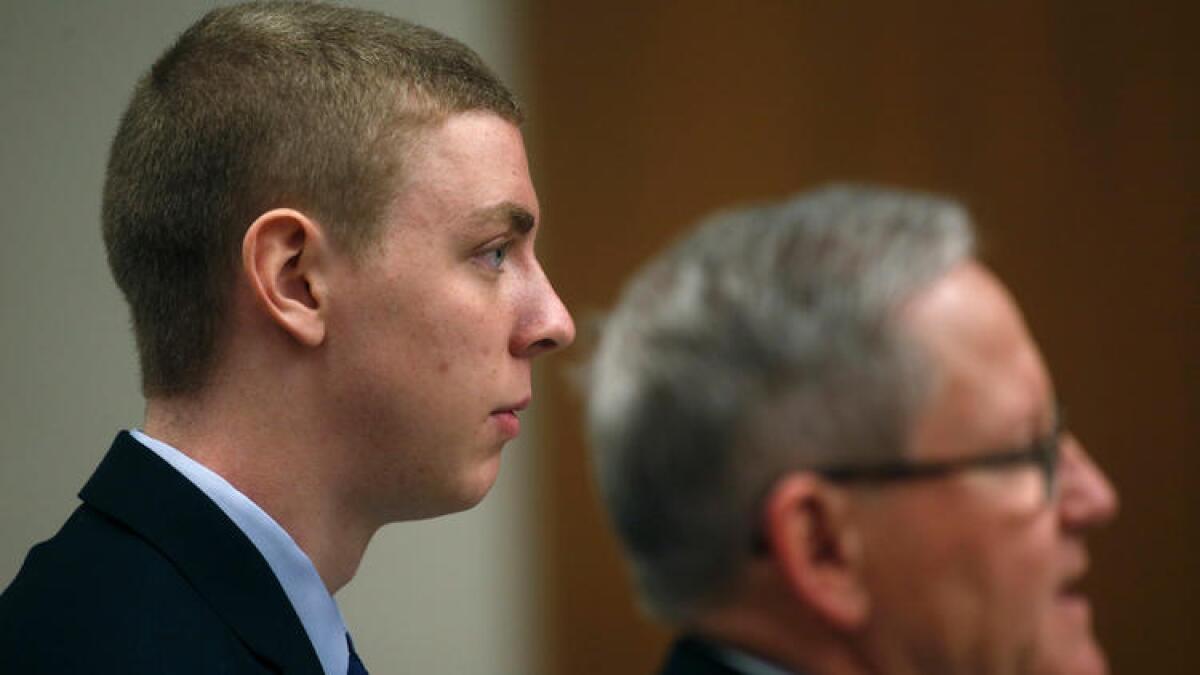
Legislation to close what prosecutors call a loophole in California’s sex assault law, a provision that kept a former Stanford student out of prison after a brutal campus attack, cleared its first legislative hurdle in Sacramento on Tuesday.
“Simply put, rape is rape,” said Assemblyman Evan Low (D-Campbell), the bill’s author. “We believe there should be consistency in addressing this issue.”
Assembly Bill 2888 was quickly introduced in the wake of public outcry over the six-month jail sentence given to Brock Turner for the sexual attack on an unconscious woman after a campus party. Under existing law, Turner was eligible for a sentence that included probation instead of prison.
Santa Clara County Deputy Dist. Atty. Alaleh Kianerci, who prosecuted Turner, told state senators at Tuesday’s hearing that the trauma experienced by the victim was no less than that of any other rape victim.
The woman who was attacked has continued to remain anonymous, identified only in court documents as Emily Doe.
“We all need to try to protect the next Emily Doe,” said Kianerci.
Anyone convicted of eight specific sexual assault crimes would no longer be eligible for probation under AB 2888, with most of the crimes being ones that involve alcohol and any other “intoxicating or anesthetic substance.”
Several lawmakers said that the bill may be best seen as addressing the larger problem of how to punish sex crimes on college campuses.
“It’s about changing a culture and preventing future crimes,” said Assemblyman Bill Dodd (D-Napa), the bill’s co-author.
- Share via
U.S. Rep. Janice Hahn brings sit-in against gun violence home to L.A.
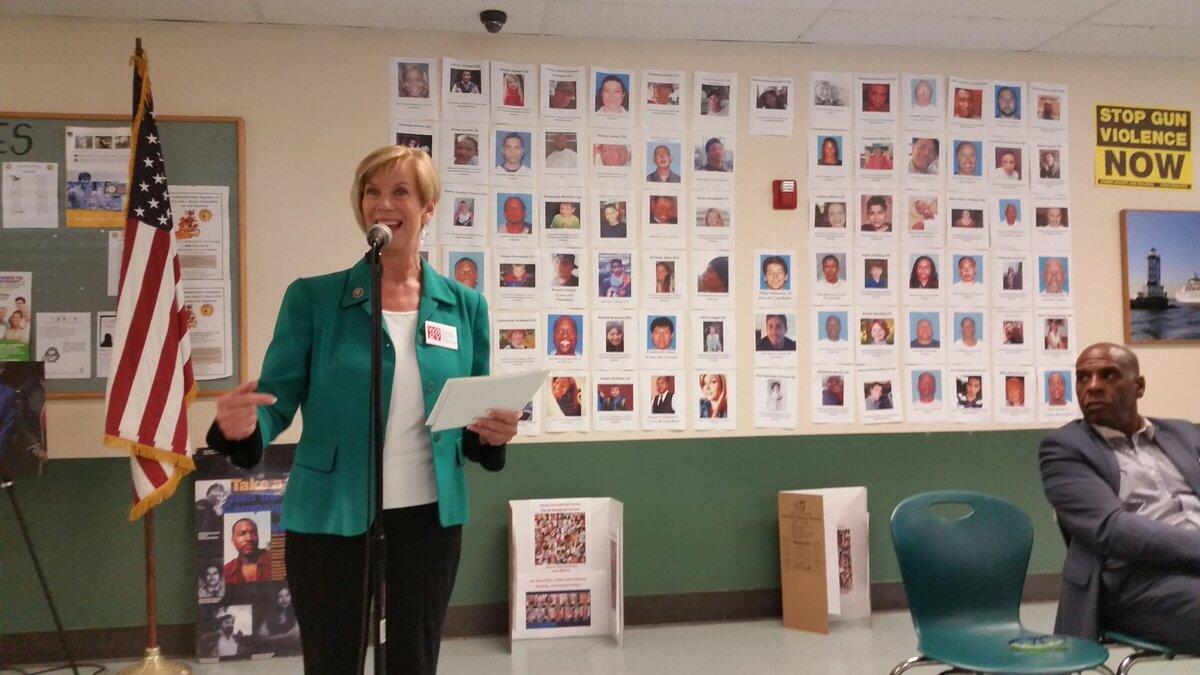
Days after participating in a sit-in on the floor of the U.S. House of Representatives, Rep. Janice Hahn (D-Los Angeles) brought an event of her own to her South Los Angeles district.
The setting, the multi-purpose room of a high school, was far less ornate and the participants sat in chairs, Hahn noted. But, she added, the sentiment was the same.
“I’m sick of moments of silence. I’m sick of silence,” Hahn said. “Let’s not take ‘no’ for an answer. We’ve had too much gun violence in this country.”
The evening opened with a clip of Rep. John Lewis’ (D-Ga.) impassioned speech at the Washington sit-in, in which he called on House leaders to call a vote for two gun control measures.
Hahn spoke in front of a wall plastered with the photos of dozens of victims of gun violence, with their names, ages and the cities where they died inscribed beneath.
“I’m not going to be shut down on this issue. They can turn off our [microphones], they can turn off the cameras,” she said. “But I’m not going to be shut down.”
One after another, community members and constituents rose to speak tearfully about friends and family members they had lost to shootings.
A woman whose nephew had been shot multiple times in the back spoke, along with a mother who said she’s afraid for her gay son’s safety after the Orlando shooting. A man whose son was killed 24 years ago said he still cries every day for him.
“These types of guns don’t belong here,” said Basil Kimbrew, whose son was killed in 1992. “I’m a strong, black man but when it comes to my kid, I wobble, you know?”
He urged Hahn to “do what you have to do...please send a message to Speaker of the House.”
Two gun rights supporters also addressed the crowd, raising issues about restricting Syrian refugees and encroachment on 2nd Amendment rights. They were booed by the crowd before being allowed to continue.
“When you do a sit-in, you do it to get rights, not take rights away,” said one speaker, who called the congressional sit-in a “waste of time.”
- Share via
California voters will be asked this November to change the rules for passing bills in the Legislature
An initiative requiring any legislation be in print for three days before final passage at the Capitol earned a spot on the Nov. 8 statewide ballot on Monday, an effort supporters claim will end the long tradition of 11th hour political deals quickly turned into California law.
Secretary of State Alex Padilla reported that the initiative’s proponents, former Republican state Sen. Sam Blakeslee and influential GOP donor Charles Munger Jr., collected more than 644,000 voter signatures. This is the final week for fall ballot measures to qualify, and as many as 17 other measures are poised to earn a spot once the list is finalized on Thursday.
For more than three years, lawmakers have considered efforts to make bills subject to a 72-hour public review period. But each of those proposals failed, leading Blakeslee and Munger to file their initiative last November.
The initiative also imposes new rules on lawmakers to broadcast their proceedings online, and it eliminates long-standing restrictions on the use of legislative video and audio in political campaigns.
In the past few weeks, lawmakers have been scrambling to offer their own version of the proposal and perhaps convince Munger to drop his effort. But in a legislative hearing last week, Munger made it clear: He won’t do it.
- Share via
California budget signed by Gov. Jerry Brown
Gov. Jerry Brown approved a new state budget on Monday, signing into law a $171-billion spending plan that will take effect on July 1.
“This solid budget makes responsible investments in California and sets aside billions of dollars to prepare for the next recession,” he said in a statement.
Brown also signed several related measures, and he didn’t veto anything from the legislation, signaling an unusual level of agreement with lawmakers. In previous years, Brown has used his line-item veto power to make small changes to the budget, even if he agrees with the overall spending plan.
The budget will increase funding for state-subsidized child care and remove a limit on welfare payments for families who have additional children while receiving benefits.
It also boosts the state’s reserves, depositing an extra $2 billion into a rainy-day fund intended as a cushion against any future economic downturns.
“California is in stronger fiscal shape than we have been for years,” Assembly Speaker Anthony Rendon (D-Lakewood) said in a statement.
More work remains on state spending. The budget sets aside $400 million for affordable housing, but it won’t be spent unless the governor and lawmakers reach a deal on streamlining regulations for building new homes.
- Share via
Top lawmakers seal bipartisan deal on homeless bond
A $2-billion bond measure to help house homeless people suffering from mental illness appears poised for approval after an agreement was reached between Democratic and Republican leaders.
The modified legislation includes new requirements for overseeing how the money is spent, and the deal includes a separate bill that sets aside additional money for homeless veterans and youth.
“The millions in new funding championed by Republicans will help our homeless veterans and youth receive the shelter and support they need to get their lives back on track,” Assembly Republican leader Chad Mayes of Yucca Valley said in a statement.
The $10 million for veterans would come from a separate bond measure approved by lawmakers in 2014, and the $10 million for youth would come from an emergency housing fund.
Meanwhile, the $2-billion bond would use revenue raised through Proposition 63, a voter-approved tax on millionaires. Because the measure involves borrowing money, it requires a two-thirds vote in the Legislature.
“Republican and Democrats alike recognize that finding permanent supportive housing for the chronically homeless suffering from mental illness will improve the quality of life in our communities and give hope to thousands of Californians currently living in despair across our state,” Democratic Senate leader Kevin de León of Los Angeles said in a statement.
- Share via
Travel problems for the Senate leader
- Share via
U.S. Senate candidate Loretta Sanchez misses House votes, gun control sit-in during week in Spain
U.S. Rep. Loretta Sanchez remained in Spain for a week after a trade mission this month, missing nine recorded votes and the Democrats’ dramatic attempt to force a vote on gun control through a sit-in.
Sanchez is running against state Atty. Gen. Kamala Harris for the U.S. Senate seat currently held by Sen. Barbara Boxer.
Sanchez’s staff initially said that the Santa Ana Democrat missed the sit-in because she was returning from a trade mission to Ourense, a city in northwestern Spain.
While Sanchez participated in a trade mission this month, the trip ended June 17. The sit-in took place from midday Wednesday mid-day to midday Thursday.
When asked Monday, Sanchez’s spokeswoman said the congresswoman stayed in Spain after the trade mission and didn’t fly back until Thursday.
Spokeswoman Emily Morris said the congresswoman met with the commandant, the governor and the chief minister of Gibraltar about commerce, Britain’s potential exit from the European Union and military issues during the intervening six days and took “a personal day.”
The trade mission, organized and paid for by the Advanced Leadership Foundation and the Spain-U.S. Chamber of Commerce, lasted from June 15-17.
According to the Advanced Leadership Foundation, the trip culminated with Sanchez giving a lunchtime speech at the monastery of Santo Estevo.
Sanchez is listed by the foundation as leading the trip, but Sanchez was recorded as casting votes on more than two dozen bills June 16 after the trade mission began. Morris said Sanchez flew to Spain after the votes.
Calls to the foundation for more information were not returned Monday.
During the six days she stayed in Spain after the trade mission ended, Sanchez missed nine recorded votes, according to the House Clerk, including votes Republicans held in the early morning hours Thursday to adjourn, effectively shutting down the Democrats’ sit-in. Representatives return July 5.
Sanchez was the only California House member not spotted during the sit-in. Many of the Golden State’s 39 House Democrats remained on the floor throughout the 25 hours of speeches about Americans killed by gun violence.
Rep. Jackie Speier (D-Hillsborough) helped plan the sit-in, but had to miss the first part of the event to attend her brother’s cancer surgery. She caught a red-eye flight to Washington and joined Democrats on the House floor at about 7:45 a.m. Thursday.
- Share via
State senators block energy policy changes sought by Gov. Jerry Brown
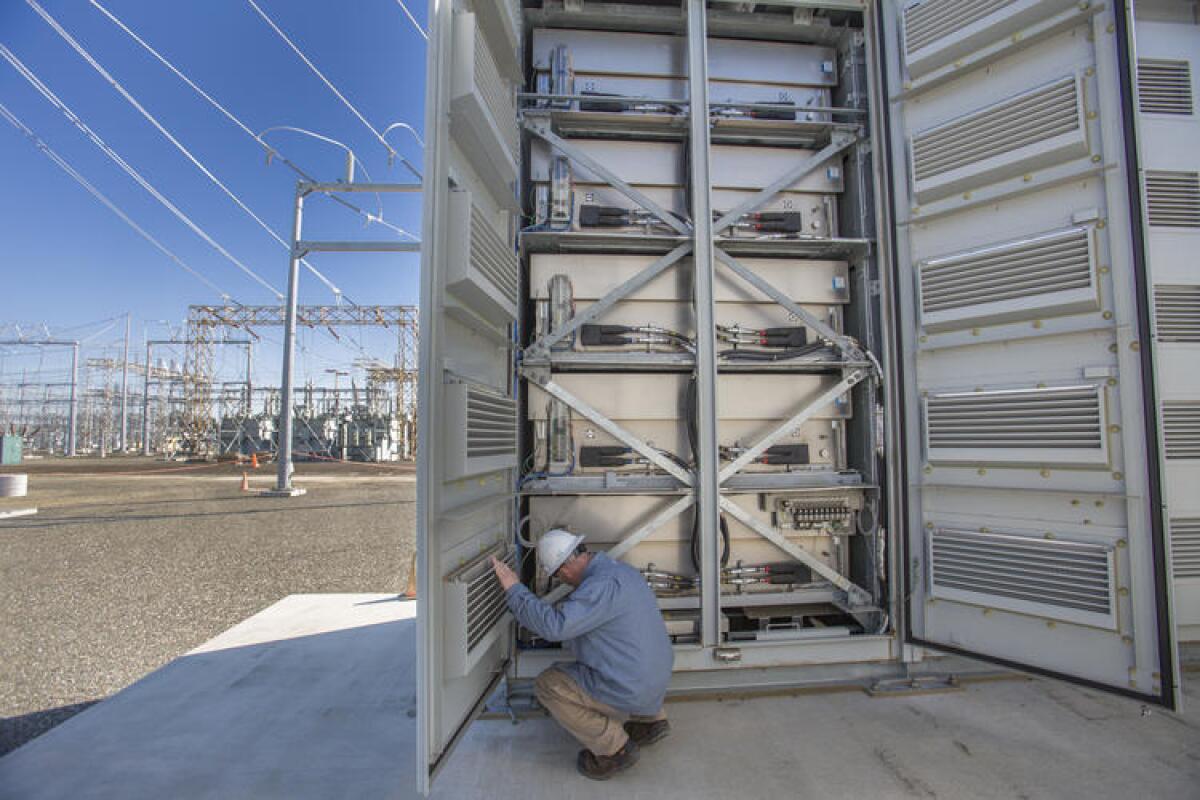
Energy proposals stalled in a state Senate committee on Monday amid concerns that Gov. Jerry Brown’s administration was trying to push major policy changes without enough public scrutiny.
The proposals, inserted into budget legislation after negotiations with Senate leadership, would double financial incentives for energy storage projects and extend subsidies for fuel cell technology.
Although Republicans often complain about last-minute changes to legislation, the anger during the Senate budget committee hearing was bipartisan.
Sen. Jim Nielsen (R-Gerber), the vice chair of the committee, called the administration’s effort “government at its very worst.” Sen. Mark Leno (D-San Francisco), the committee’s chair, expressed his “disappointment.”
Administration officials at the hearing struggled to answer all the senators’ questions about the changes, saying they would need to summon additional staff to explain the policies.
“We’re here trying to figure out what’s in the bill right now,” Sen. Richard Pan (D-Sacramento) said. “We’re being asked to vote on this when we don’t know what the implications are.”
Amy Costa, the governor’s chief deputy director of finance, defended the proposals as expansions of existing, successful programs to support clean energy goals. She also said they represented an agreement reached between the Brown administration and Senate leader Kevin de León (D-Los Angeles).
But senators said they would hold off voting on the measure.
“I’m not arguing the policy,” Leno said. “But I think it’s our job ... to better understand that policy.”
- Share via
Gov. Jerry Brown and lawmakers announce major reorganization of California’s energy regulating agency

Gov. Jerry Brown and lawmakers announced a broad overhaul of the state’s main energy regulator on Monday, a response to a scandal involving the agency’s decommissioning of a Southern California nuclear facility and criticism in its handling of new technologies including Uber, Lyft and other ride-hailing companies.
The broad reform package includes a number of efforts to boost transparency and oversight at the California Public Utilities Commission, including more frequent online disclosure of communications between commissioners and those affected by their decisions.
The commission has been under intense scrutiny after its former president, Michael Peevey, had an undisclosed meeting in Poland with a Southern California Edison executive regarding the assigning of costs between the company and rate payers for the decommissioning of the shuttered San Onofre nuclear power plant in northern San Diego County.
The reorganization announced Monday would also transfer regulation of the fast-growing ride-hailing industry from the CPUC to the California State Transportation Agency. Many, including CPUC executives, have said that the existing structure for regulating Uber and Lyft is outdated and lacking expertise needed to protect consumers and drivers while also allowing for the companies’ growth.
“These reforms will change how this commission does business,” Brown said in a written statement. “Public access to meetings and records will be expanded, new safety and oversight positions will be created and ex parte communication rules will be strengthened.”
The deal comes after Assemblyman Mike Gatto (D-Glendale) had pushed for a constitutional amendment to reorganize the CPUC. Gatto was part of negotiations on the reform package and praised the effort.
“These reforms mark a new beginning for the CPUC,” Gatto said in a written statement. “The commission will become transparent and accountable to Californians and focused on the safety of our communities.”
- Share via
Lawmakers add the needs of veterans, youth homeless to state budget plan
Lawmakers have added earmarks for helping veterans and youth who are on California’s streets to a high-profile effort expected to become part of the new state budget by the end of the week.
Legislation quietly introduced Thursday would modify and expand an effort that began with a $2-billion bond package to help those who are homeless and suffer from mental illness.
The bond proposal, first introduced by Senate Democrats in January, was modified to include new requirements including online disclosure of how bond proceeds are spent and performance reviews of county agencies that administer the programs.
In a written statement, Assembly GOP leader Chad Mayes (R-Yucca Valley) said on Saturday that his caucus “fought to create more oversight and accountability in how funds to serve the state’s mentally ill population are spent.”
Democratic legislative leaders didn’t immediately respond to a request for comment. The bills are scheduled to be heard by the Senate Budget Committee on Monday morning.
Another newly negotiated plan will, if signed into law, earmark $10 million to help homeless youth and another $10 million from a 2014 veterans bond to focus on ex-servicemembers who are homeless.
The $2-billion bond proposal was embraced by Gov. Jerry Brown in his revised budget last month but was one of the unfinished parts of the budget sent to Brown on June 15. It requires a bipartisan supermajority vote in both houses of the Legislature, which legislative and lobbyist sources said required additional negotiations over the last several days.
- Share via
Friday statewide vote count tops 8 million from the June 7 primary
- Share via
A $500-million climate-change plan without any money behind it
Industry leaders and environmental activists made their way to the California Air Resources Board on Thursday to advocate for money for programs to combat climate change.
The board agreed, signing off on a $500 million plan to fund clean-car subsidies and numerous other programs.
But the board’s approval won’t actually result in any cash getting spent. Advocates are waiting on Gov. Jerry Brown and lawmakers to reach a deal to send the money to the board, something they hope will happen by the end of the legislative session in August.
- Share via
Brady Campaign gun-safety group endorses Kamala Harris for Senate
Citing her experience with gun laws, one of the largest gun safety advocacy groups in the nation has endorsed state Atty. Gen. Kamala Harris in the Senate race in California.
“In Kamala Harris, Californians have found the only Senate candidate they can trust to stand up to the corporate gun lobby and disarm the hate that kills thousands of Americans every year,” Dan Gross, the president of the Brady Campaign to Prevent Gun Violence, said in a statement. “We know she’ll walk the walk, she’s done it her entire career. As attorney general, Harris worked alongside the Brady Campaign’s 27 California chapters to spearhead a record-setting program to get and keep guns out of dangerous hands, no doubt saving lives.”
In the November election, California voters will choose between two Democrats to replace retiring Sen. Barbara Boxer — Harris and Rep. Loretta Sanchez.
Harris said in a statement that she is honored to have the endorsement.
In October, Harris slammed Congress for failing to pass new gun restrictions after the 2012 shooting at Sandy Hook Elementary School in Connecticut.
The Brady Campaign also praised Harris for a state Department of Justice program to determine whether potentially dangerous people own guns in violation of state law.
The Brady Campaign was supportive of Harris throughout the primary election, including criticizing Sanchez for an April 22 op-ed article in the Sacramento Bee in which she defended her 2005 vote for the Protection of Lawful Commerce in Arms Act.
Sanchez broke with most House Democrats to vote for the act, which protects gun manufacturers and dealers from being held liable if their product is used to commit a crime.
“While her opponent may feel the gun industry, whose products kill 90 Americans every day, deserves a free pass in the form of special legal protections — Kamala Harris doesn’t,” Gross said in the statement.
- Share via
Assembly resolution asks Gov. Jerry Brown for a homeless state of emergency
Lawmakers from Los Angeles and San Francisco took the unusual step Wednesday of introducing a resolution asking Gov. Jerry Brown to declare a statewide emergency to help California’s homeless population.
“Homelessness has risen to historic levels across the state and now is the time for action,” says House Resolution 56, authored by Assemblymen Miguel Santiago (D-Los Angeles) and Phil Ting (D-San Francisco).
An emergency declaration would increase state money and staff time to the cause. Supervisors in both counties have passed their own resolutions calling on Brown to act.
“The Legislature wants to tackle this issue,” Santiago said. “We want to keep it on the front burner.”
California had roughly 115,700 people living on the streets in 2015, the most of any state in the nation. Some 47,000 of those are believed to be in Los Angeles.
“You see people of all ages and all walks of life,” he said. “This is a public health crisis, and we want to get some attention on this.”
Los Angeles supervisors have also sought a local income tax on millionaires to fund homeless prevention programs. Brown has rejected both the tax and a statewide emergency declaration.
In letters and visits to Sacramento, Los Angeles County Supervisor Mark Ridley-Thomas has invited the governor to see the problem for himself. On Monday, the county delivered a petition with nearly 11,400 signatures from citizens in favor of an emergency declaration.
- Share via
Minimum wage ballot measure formally removed from November’s statewide ballot
The healthcare workers union that successfully placed a minimum wage increase on the November statewide ballot formally withdrew the proposal Thursday, two months after Gov. Jerry Brown signed a similar plan into law.
“We think the law that was passed is a really good law,” said Steve Trossman, a spokesman for the Service Employees International Union-United Healthcare Workers and one of the initiative’s official proponents.
Days after the SEIU-UHW measure qualified for the ballot in March, Brown and lawmakers announced their own deal on a plan to boost the statewide minimum wage to $15 an hour. That law will gradually raise low-wage paychecks over the next five years.
Trossman believes the union’s success at gathering signatures on its own proposal sparked lawmakers to take action.
“We’re really proud of the role that we played in pushing that ball across the goal line,” he said Thursday.
The union’s minimum wage initiative is the first measure to be withdrawn under a 2014 state law that allows proponents a last-minute reprieve in hopes of inspiring more negotiations and fewer costly ballot measure campaigns. Even so, the fall ballot is expected to include more propositions than any California election in more than 15 years.
Secretary of State Alex Padilla officially will certify the final list of Nov. 8 ballot measures next week.
- Share via
Sacramento judge moves to cancel a November ballot initiative limiting salaries of hospital CEOs
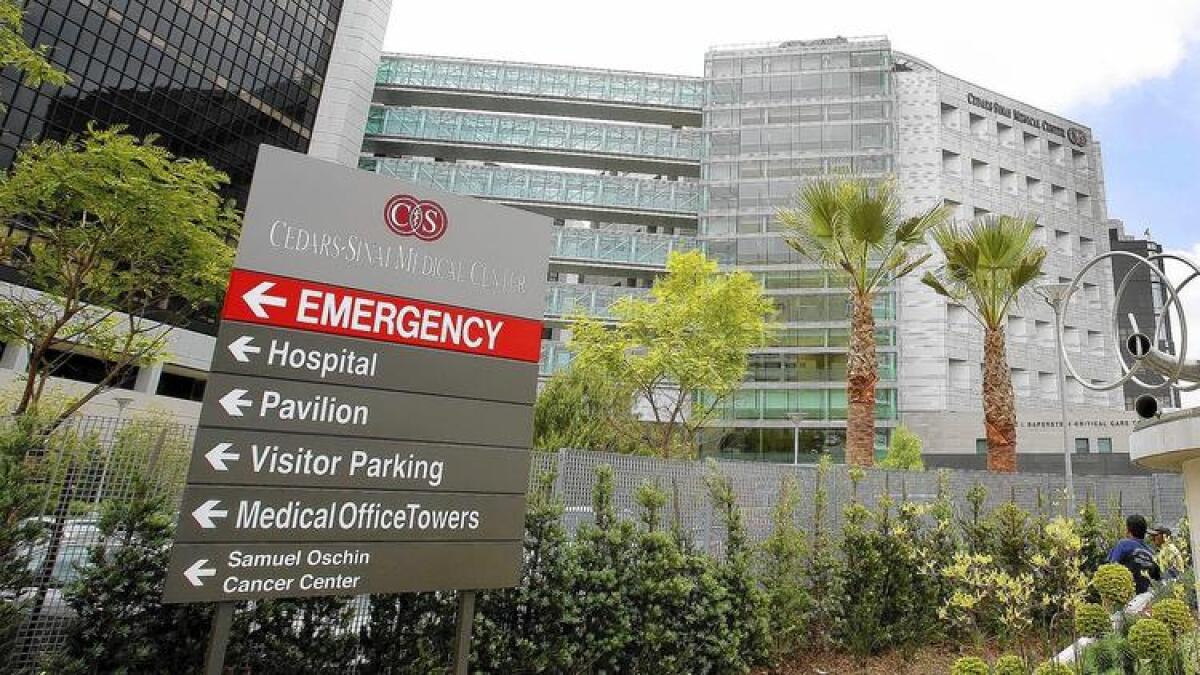
An effort to cap the salaries of hospital executives may be blocked from California’s Nov. 8 ballot, after a Sacramento judge wrote Thursday that its labor union backers broke a political peace treaty with hospitals.
If upheld, Sacramento Superior Court Judge David Brown’s ruling would force Service Employees International Union-United Healthcare Workers West to withdraw an initiative that would limit executive compensation at nonprofit hospitals to $450,000 a year.
SEIU-UHW turned in almost 650,000 voter signatures on the measure last month, and it’s likely to qualify for the ballot next week.
“Unfortunately, the voters of California may be denied their ability to decide whether someone running a charity can make $5 million or $10 million a year,” said SEIU-UHW spokesman Steve Trossman.
The case involved a complex 2014 agreement between the healthcare workers union and the California Hospitals Assn., one that avoided a similar ballot fight and attempted to bring the two rivals together on issues related to hospital staffing and funds for the state’s Medi-Cal program.
But an arbitrator’s report on June 6 said the formal contract includes a provision that SEIU-UHW wouldn’t file any ballot initiatives “adverse” to the hospitals. The arbitrator concluded the agreement had been broken and that the union would have to cancel its 2016 initiative effort.
Trossman said that SEIU-UHW still believes its employees who filed the initiative did so as California voters and thus did not constitute a contract breach by the union.
“The organization, UHW, doesn’t control this initiative,” he said.
Even so, Trossman said the union will decide next week whether to appeal the judge’s ruling or allow the initiative to be scrapped.
A spokeswoman for the California Hospitals Assn. said the organization wouldn’t comment until the judge’s ruling was made final Friday.
The ruling coincidentally came on the same day that SEIU-UHW formally withdrew a different initiative -- on the minimum wage -- from the November ballot.
- Share via
Lt. Gov. Newsom’s gun control initiative qualifies for the November ballot
Just days before the Legislature is scheduled to act on a package of gun control measures, state election officials announced Thursday that an initiative by Lt. Gov. Gavin Newsom to restrict firearms has enough signatures to qualify for the November state ballot.
The Secretary of State’s Office said a verification process using a random sample estimated that at least 402,468 of the 600,000 signatures turned in were valid and from registered voters, so the Safety for All Act has officially qualified to be on the ballot.
“Enough massacres, death, tears, and hate – it’s time to take action and save lives,” Newsom said in a statement Thursday. “The Safety for All initiative gives California voters the opportunity to keep guns and ammo out of the hands of violent, dangerous, hateful people. America has too many guns and too much hate. The result is the massacre in Orlando, and dozens of other gun deaths every single day.”
Opponents , including Chuck Michel, co-chair for the Coalition for Civil Liberties, plan to campaign against the initiative.
“Californians believe in more civil liberties, not fewer freedoms,” Michel said. “Gavin Newsom’s political maneuver will be defeated because it does nothing to stop the next ISIS-inspired attack.”
The initiative would require background checks for bullet buyers, a ban on possessing ammunition magazines holding more than 10 rounds, a mandate for felony charges for gun thefts and a strict process for getting guns out of the hands of felons and others disqualified from possessing firearms.
Many similar proposals are included in legislation proposed by lawmakers who hoped to avoid having the issue go to the voters.
State law allows initiative proponents to drop their proposals if they are satisfied that the same goals are accomplished by legislation.
Sen. Jerry Hill (D-San Mateo) said Thursday that Newsom should drop his initiative if the bills are approved next week.
“If we pass the bills, there is no need to confuse the voters with an initiative,” Hill said.
But Newsom, who is a candidate for governor in 2018, said that his initiative goes further and that he has no plans to sideline the measure, even if some bills are signed into law.
“The initiative makes reforms the Legislature has failed to enact, as well as others the Legislature isn’t even considering, and others that they simply don’t have the authority to legally address,” Newsom wrote recently to Senate leader Kevin de León (D-Los Angeles).
- Share via
Republican in heavily Latino district says he can’t back Donald Trump
U.S. Rep. David Valadao (R-Hanford) said Thursday he can’t support presumptive Republican nominee Donald Trump.
Valadao has avoided talking about the presidential race for months, saying he would support the eventual nominee.
But in a statement released by his campaign Thursday, Valadao said he can’t support Trump and he won’t back presumptive Democratic nominee Hillary Clinton either.
Valadao’s district is 71% Latino.
“I am disappointed with the divisive rhetoric coming from this Presidential Election and cannot support either candidate. I cannot back a candidate who denigrates people based on their ethnicity, religion, or disabilities,” he said.
Democrats have targeted Valadao’s Central Valley district as a potential pick-up opportunity in the fall.
Provisional and vote-by-mail ballots are still being counted in Fresno, Kern, Kings and Tulare counties, and it isn’t yet clear whether Valadao will face Emilio Jesus Huerta or Daniel Parra in the fall. As of Thursday morning, Huerta led by 1,099 votes.
- Share via
Senators take the push-up challenge in Sacramento
- Share via
Ro Khanna maintains lead against congressman in Silicon Valley battle
Nearly all ballots have been counted in the Democratic slugfest in Congressional District 17, where repeat challenger Ro Khanna looks to have bested incumbent Rep. Mike Honda (D-San Jose).
The latest count shows Khanna leading Honda 39.1% to Honda’s 37.4%. Final results in Alameda County show Honda down by more than four points. In Santa Clara County, where nearly three-quarters of the district’s voters live, the race is much closer. Officials say they have eight ballots outstanding, and Khanna is ahead by 777 votes.
Thanks to California’s top-two primary, both will advance to November.
The results could signal trouble ahead for the eight-term congressman, who defeated Khanna by just four points in 2014 and is facing an ongoing ethics investigation.
Khanna campaign spokesman Hari Sevugan said the latest results were a “death knell” for Honda’s chances in November, adding that he “simply does not have a path to victory.”
“He lost Democrats. He lost in Santa Clara County and Alameda County. He lost election day voters and absentee ballot voters,” Sevugan said in a statement.
Sevugan noted that the only other Democratic incumbent in Congress to lose in the primary was Rep. Chaka Fattah (D-Pa.), who resigned Thursday after being convicted of racketeering and money laundering.
Honda’s campaign spokesman Vedant Patel said they expect Honda’s support to grow in November.
“There’s no question this race is going to be close, but Congressman Honda has strong support among middle-class families who trust his track record of delivering for Silicon Valley,” Patel said.
Patel criticized Khanna for receiving support from what he said were “Wall Street interests and individuals pushing anti-worker agendas.”
- Share via
Jerry Brown responds to U.S. Supreme Court’s immigration decision
- Share via
Coastal Commission gets an emergency loan and an audit of its fiscal management
Gov. Jerry Brown’s budget advisors have approved an emergency loan of $1.45 million to the California Coastal Commission after an agency staffer said it was in danger of not making payroll in July.
A letter sent to legislative leaders this week by Brown said this is the second consecutive year of a cash crisis for the commission, prompting a formal audit of its money management.
- Share via
Assembly approves $3.1-billion park bond measure for November ballot
The Assembly on Thursday gave initial approval to putting a $3.1-billion bond measure on the November ballot for parks, water and climate change action.
The proposal, which next goes to the state Senate for consideration, addresses concerns that California’s parks have not been properly maintained.
Assemblyman Eduardo Garcia (D-Coachella) noted that it has been 14 years since the state approved substantial new funding for park maintenance and improvements.
“We know that state parks have a deferred maintenance backlog of over $1 billion,” Garcia told his colleagues.
The measure was approved on a 55-14 bipartisan vote. Assemblywoman Catherine Baker (R-San Ramon) said operators of local parks in her district would welcome the ability to compete for matching funds.
However, the measure was opposed by Brian Jones (R-Santee), who said the state could fund the parks improvements from the current budget without borrowing and there are other bonds available for water and land conservation.
“We don’t have to go into additional debt for those programs,” Jones told his colleagues. “The money is there.”
At the last minute, Garcia amended the bill to increase the bond from $2.95 billion to $3.12 billion and to increase the amount going to disadvantaged communities from 10% to 20%.
As he worked to win support, Garcia also agreed to amend his bill to earmark tens of millions of dollars to specific park programs including those in San Diego, Ventura County, Central Valley and the High Desert/Coachella area.
- Share via
At the House Democrats’ gun sit-in, a shouting match broke out and lawmakers had to be separated
Rep. Brad Sherman was dramatically interrupted during his plea for a vote on gun legislation at the House Democrats’ sit-in Wednesday night. As Sherman spoke, Texas Republican Rep. Louie Gohmert stormed onto the floor, screaming that “radical Islam” killed the Orlando mass shooting victims.
A group of at least 50 Democrats had been staging a sit-in on the House floor for nearly 12 hours to try to force a vote on gun legislation before the House adjourned for the Fourth of July holiday.
Emotions were already running high when Sherman (D-Sherman Oaks) began speaking. The chamber had just finished up several votes called by Republicans as Democrats continued to yell and demand a gun vote. Democrats took control again after the House went back into recess, but a handful of Republicans hung around and heckled Democrats as they spoke.
During Gohmert’s outburst, he pointed at a poster of victims of the Orlando shooting being held by Rep. Corrine Brown, the Democrat who represents the part of Orlando where the shooting took place.
Gohmert and Brown got into a heated conversation and had to be physically separated by colleagues.
Sherman said a few more words and was replaced by Rep. Zoe Lofgren (D-San Jose), who tried to defuse the tension in the room.
House Majority Leader Kevin McCarthy (R-Bakersfield) also came into the chamber and had a quiet word with the remaining Republicans.
- Share via
Clinton’s California lead over Sanders remains similar to Tuesday’s count
- Share via
Los Angeles County supervisor invites Gov. Jerry Brown to come see the homeless problem for himself
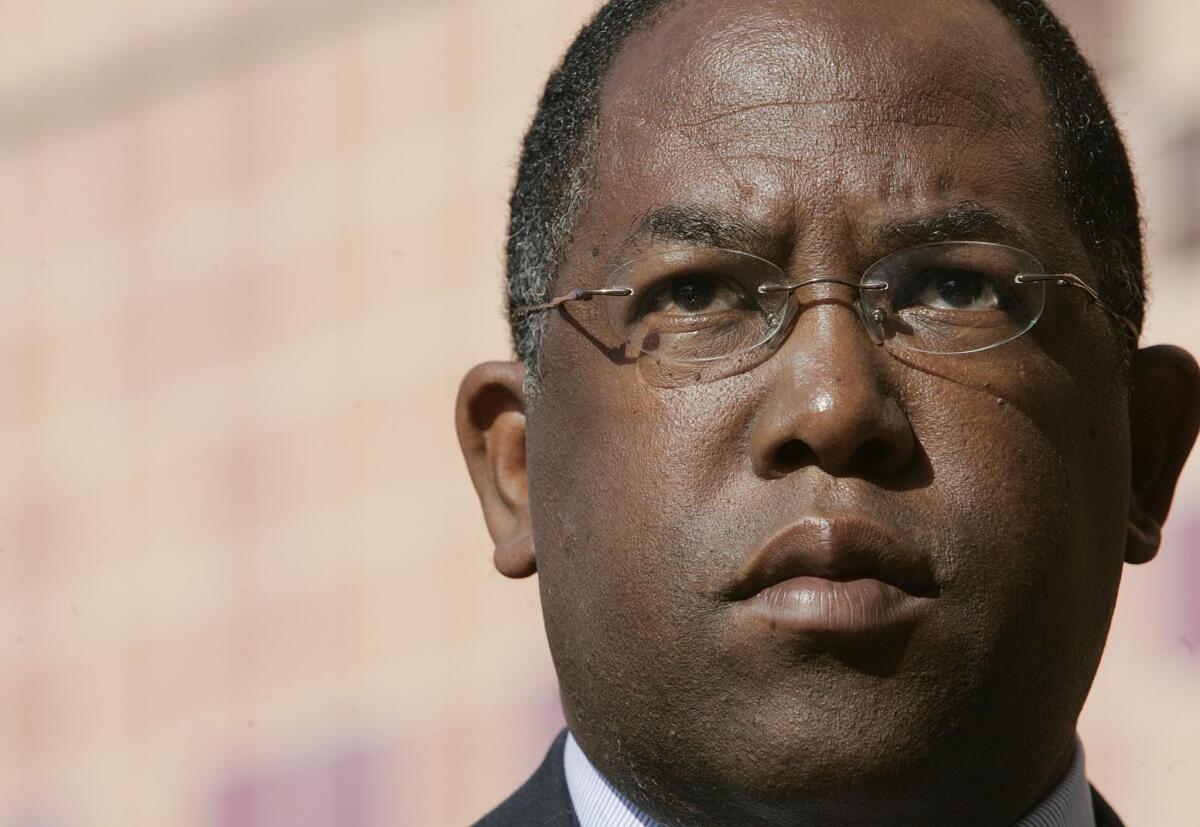
A leading voice on the Los Angeles County Board of Supervisors on the rising tide of homelessness says Gov. Jerry Brown should see what’s going on for himself.
“I’d like to invite him down to Los Angeles,” said Supervisor Mark Ridley-Thomas in an interview while visiting Sacramento on Wednesday.
County leaders have been pushing for help from the state government for some 47,000 people living on Los Angeles streets. Their main effort, a request for Brown and lawmakers to allow Los Angeles County voters to impose a local income tax on the most wealthy taxpayers, has largely fallen flat in recent weeks.
Ridley-Thomas and others have since asked the governor to declare a state of emergency, which also has not met with much success.
The supervisor, who said that he’s made a weekly trip to lobby Sacramento lawmakers for the last month, said he wants Brown “to experience the intensity of the public health and the public safety crisis” the homelessness epidemic has created.
“There is no way that you can see it and not be shaken by it,” he said.
Evan Westrup, a spokesman for Brown, said Thursday that the governor’s experiences as mayor of Oakland and a volunteer with Mother Teresa mean that he “doesn’t need a tour from a politician to understand or appreciate the impacts.”
“These are concerns many Californians share and it’s why the administration is directing billions of dollars to affordable housing, mental health and anti-poverty programs and will continue to support local governments as they tailor solutions to the needs of their communities,” said Westrup.
- Share via
Watch live as House Democrats hold sit-in over gun control vote
Rep. Scott Peters (D-San Diego) has live-streamed the House Democrats’ gun-control sit-in on Periscope for more than nine hours. C-SPAN aired his footage, as its cameras were turned off when House majority leaders took a recess.
Peters told the Guardian that he’s never used the app before.
“I downloaded it on the House floor, and turned it on,” he said.
By evening, after more than nine hours, House Republicans returned to the chamber and began attempting to end the sit-in by holding votes on unrelated issues. Democrats continued to push for a vote on the gun legislation, chanting, “Give us a vote!”
That didn’t stop the House from recessing and shutting down the cameras -- again.
Democrats carried on with their sit-in.
- Share via
Measure to open up police misconduct records could go before voters in 2018
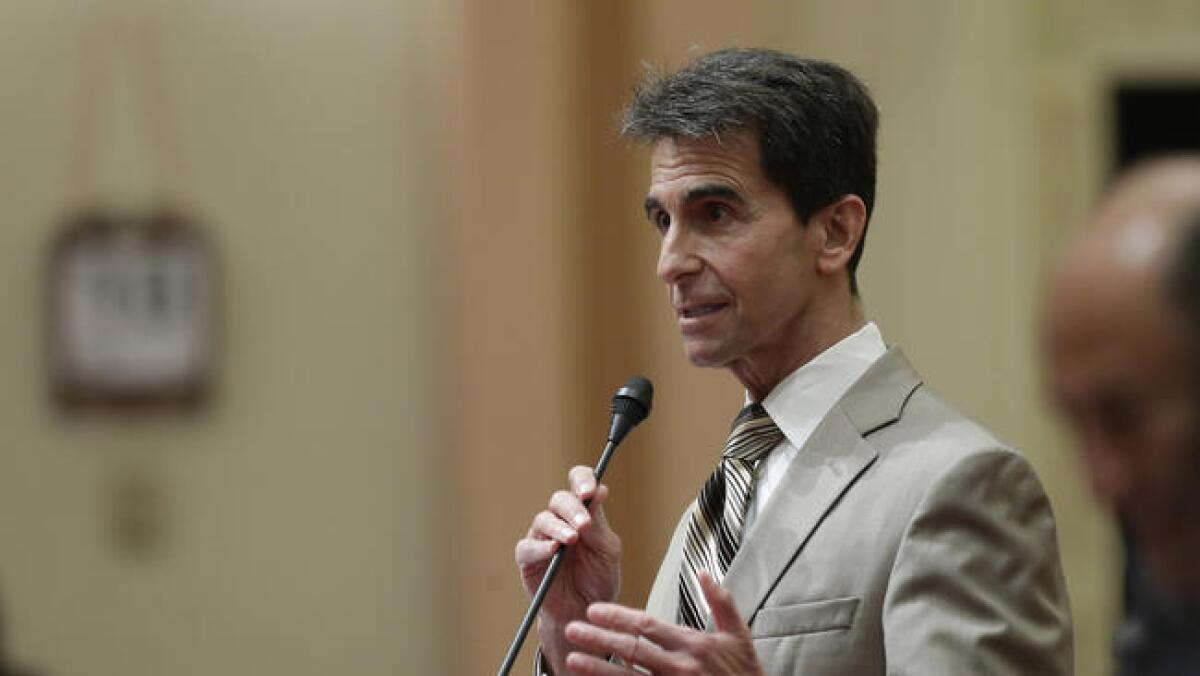
The author of failed legislation to open up some police misconduct records to public disclosure said he might force the issue on the statewide ballot in 2018.
The bill from state Sen. Mark Leno (D-San Francisco) died in a Senate committee last month amid strong lobbying from law enforcement groups. Leno, who will be forced from office later this year due to term limits, told KQED News that he’s considering the ballot box as an alternative.
“It’s quite possible it cannot be done legislatively, that the power of the law enforcement lobby is so intense that it’s not going to move successfully through the Legislature,” Leno told the public radio station. “The only way we may have to change these secrecy laws would be to go to the ballot.”
Leno’s bill failed weeks before a major internal sexual misconduct scandal enveloped the Oakland Police Department and city officials have been unable to make significant information about the case public.
Twenty-three states keep most public employee personnel records confidential, but California is one of just three to provide specific protections for police information.
- Share via
Two California House Democrats miss gun control sit-in
Two California House Democrats were not in Washington on Wednesday and didn’t make an appearance on the House floor during the Democrats’ sit-in to protest a lack of action on gun control, but Reps. Jackie Speier and Loretta Sanchez said they plan to participate Thursday if it’s still going on.
The other 37 of California’s 39 House Democrats participated in the sit-in, some sitting for hours on the House floor with dozens of their colleagues who held control of the chamber to demand a vote on gun legislation before they leave at the end of the week. Sen. Barbara Boxer and several other senators made appearances as well.
Sanchez of Orange was returning from a trade trip abroad and will be back in Washington on Thursday, her staff said.
Speier of Hillsborough was among the House members who cloistered away to plan what Democrats could do to force a vote, her staff said. But she needed to be at the hospital Wednesday for her brother’s cancer surgery, she said in a Facebook post.
As a congressional aide in 1978, Speier was shot five times while on a congressional fact-finding mission to investigate the People’s Temple in Jonestown, Guyana.
- Share via
Lawmakers’ trip to Panama coincides with busy legislative week before summer recess
One week before the Legislature leaves town for a monthlong break, Assembly Speaker Anthony Rendon and a few of his Democratic colleagues are squeezing in a quick trip to Panama.
Rendon, a Democrat from Paramount, is heading south to mark the recent widening of the Panama Canal, an expansion that will double its capacity and allow for bigger ships to pass through.
He will be joined by former Speaker Toni Atkins (D-San Diego) and Assemblymen Tony Thurmond (D-Richmond) and Jose Medina (D-Riverside). The trip was first reported by the Sacramento Bee.
“Given California’s longstanding trade ties with Panama, the trip enables California legislators to maintain relationships with Panamanian policymakers and businesses and to explore options for collaboration on trade and other matters of mutual benefit,” said Kevin Liao, a spokesman for Rendon.
The delegation will be in Panama from Saturday through Tuesday, attending an opening ceremony for the expanded canal on Sunday. The visit coincides with the final days of legislative work before lawmakers leave on recess for the month of July.
It could be a busy week. Senate leader Kevin De León has said he wants a sweeping package of gun control bills — now pending in the Assembly — to pass by the end of June.
Other major policy efforts loom, including a $2-billion plan to build housing for California’s homeless population and several loose ends remaining in the budget. Those issues can be taken up when the Legislature reconvenes in August if they are not resolved next week.
- Share via
Former L.A. Mayor Richard Riordan picks his candidate in California’s U.S. Senate race
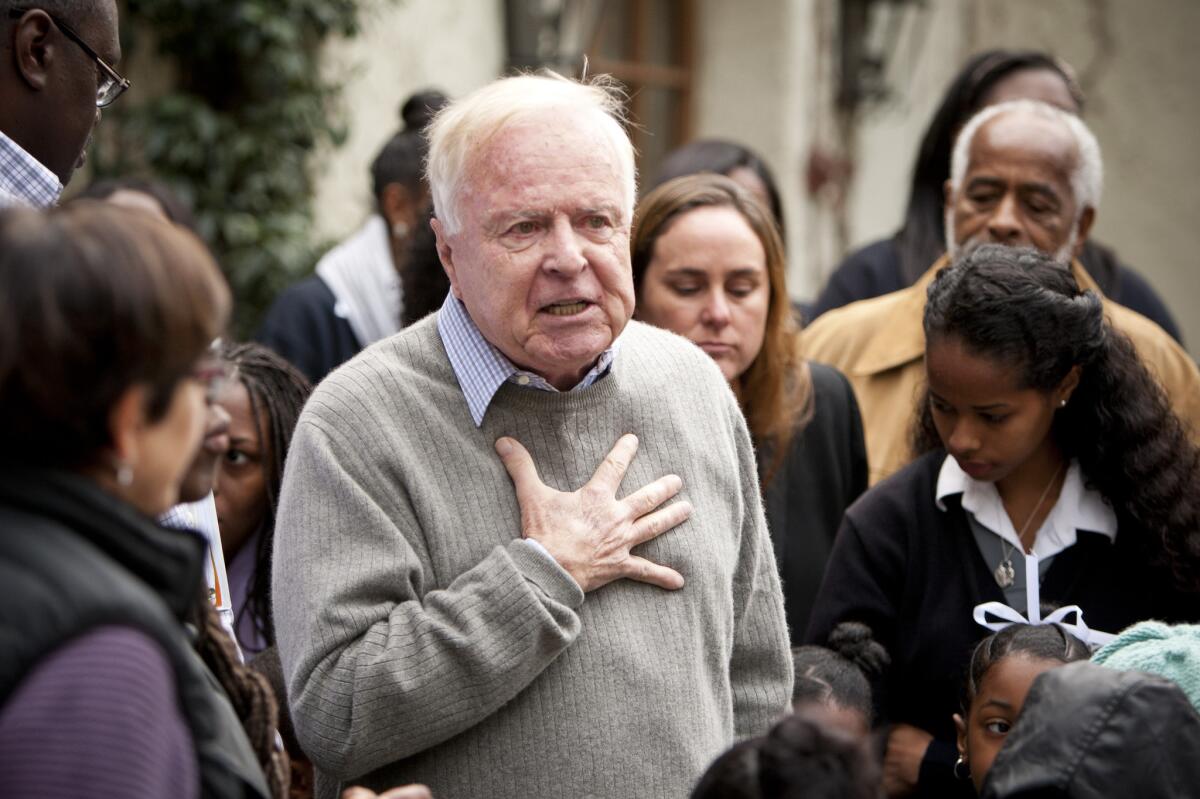
Former Los Angeles Mayor Richard Riordan, a political maverick who has never been shy about bucking his Republican Party, on Wednesday endorsed Democratic Rep. Loretta Sanchez for U.S. Senate.
Riordan said he has known the Orange County congresswoman for years and that Sanchez is “tough and not afraid to take a stand on important issues.”
Riordan praised Sanchez’s ability to work across the aisle in Congress during her 20 years in office and her record as a fiscal moderate.
In the November election, California voters must choose between two Democrats to replace Barbara Boxer in the U.S. Senate — Sanchez and state Atty. Gen. Kamala Harris. Boxer, a Democrat, is retiring after four terms.
The former mayor criticized Harris for being too far to the left politically.
Riordan cited a case in 2008, while Harris served as San Francisco district attorney, when a recently convicted cocaine dealer, Alexander Izaguirre, avoided prison after being accepted into Harris’ “Back on Track” jobs program. Izaguirre, an immigrant, was in the U.S. illegally. He later stole a woman’s purse and then drove into her with an SUV.
“I think she’s a crazy liberal. Not a true liberal,” Riordan said of Harris.
Harris has the backing of the California Democratic Party and Gov. Jerry Brown, and Sanchez has been endorsed by 16 members of California’s congressional delegation.
Riordan was elected mayor of Los Angeles in 1993 and during his two terms was credited with restoring the city after the Los Angeles riots and the 1994 Northridge earthquake.
Riordan often has rankled his fellow Republicans with his independent, unpredictable politics. He endorsed Democratic Sen. Dianne Feinstein in her successful 1994 bid for reelection.
He also endorsed then-Democratic presidential nominee Barack Obama in 2008, criticizing GOP presidential nominee John McCain’s past support for financial deregulation.
- Share via
California lawmakers criticize Congress for inaction on gun control
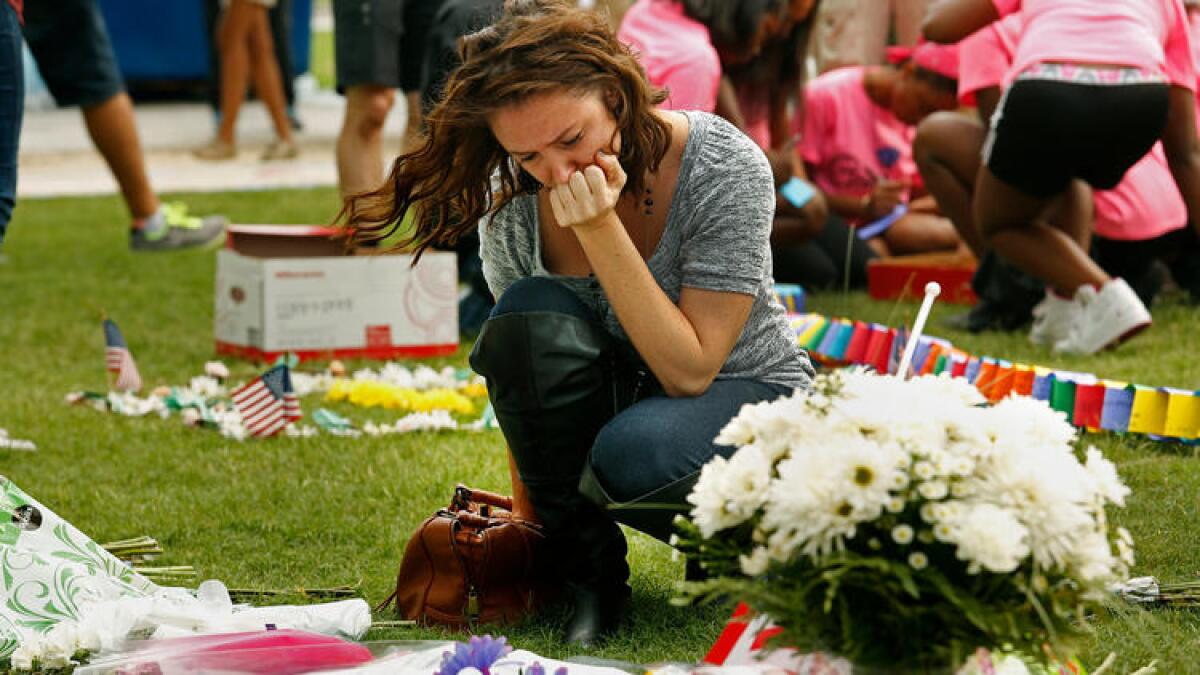
Leaders of the Legislature on Wednesday chided Congress for inaction on gun control in the wake of a series of mass shootings including this month’s terrorist attack on an Orlando, Fla., nightclub that killed 49 people.
At a rally on the Capitol steps, Senate President Pro Tem Kevin De León (D-Los Angeles) and others contrasted Congress with the Legislature, saying state lawmakers hope to send Gov. Jerry Brown a package of more than a dozen gun-control bills by the end of this month.
“We all know that Congress may not have the courage to do something about it, but we do,” De León told the crowd of 100 activists from the Moms Demand Action/Everytown for Gun Safety coalition. “We will act with the appropriate level of urgency in response to the scourge of gun violence on our streets, in our schools, our places of worship and other gathering places.”
Assemblyman Miguel Santiago (D-Los Angeles) cited votes by both chambers of the Legislature to approve several gun-control bills.
“It’s not every day that people like you or me are able to beat back the NRA and get our bills through. This is really historic,” Santiago said. “Congress was not able to do it, and we are doing it here in California.”
Lawmakers including Assembly Speaker Anthony Rendon (D- Los Angeles) touted a bill that would close a loophole that allows gun owners to loan their weapons to others for 30 days without background checks.
“As the violence in Orlando has once again reminded us, it’s past time for action,” said Rendon, who noted that five of his relatives have been shot, including three who were killed by guns. “None of us are immune from the tragedy that guns deliver every day in communities throughout our state.”
Before the rally, De Leon and Rendon met with Gov. Jerry Brown on the gun bills in a session one source described as “productive” but Brown has not made any commitments.
The pledge of action by six legislators was lauded at the rally by Jen Reidy, a volunteer for the coalition. “The shooting in Orlando showed us how urgent it is to keep guns out of the hands of dangerous people,” Reidy told the crowd.
- Share via
In response to Stanford case, state Democrats propose mandatory prison sentences for rape convictions
In response to the high-profile case of a Stanford student sentenced to six months in jail after his rape conviction, state Democratic lawmakers are introducing two competing bills to mandate prison sentences in such cases.
“We need to send the message that sexually assaulting vulnerable victims who are intoxicated or unconscious is a serious crime,” said Assemblyman Bill Dodd (D-Napa). “Letting a rapist off with probation and little jail time re-victimizes the victim, dissuades other victims from coming forward and sends the message that sexual assault is no big deal.”
Dodd is one of a trio of Northern California legislators behind one bill along with Sen. Jerry Hill (D-San Mateo) and Assemblyman Evan Low (D-Campbell). The bill would prohibit probation or suspended sentences in cases where the victim was unconscious or too intoxicated to give consent.
Also Wednesday, Assemblywoman Nora Campos (D-San Jose) said she planned to sponsor her own mandatory prison legislation for rape convictions involving unconscious victims.
“It is time that victims receive justice and that their rapists are not just given a slap on the wrist,” Campos said in a statement. “Victims deserve better, our justice system can do better.”
Since Santa Clara County Superior Court Judge Aaron Persky handed down his sentence earlier this month, Sacramento lawmakers have gotten behind multiple efforts to respond to the case. The California Legislative Women’s Caucus, for instance, has announced it would fundraise to assist an attempt to recall Persky.
- Share via
California Democrats are part of the House of Representatives sit-in on gun legislation
- Share via
Legislators push a potential showdown on the November ballot over transparency at the state Capitol
Democrats in the Legislature continued their effort Wednesday to force a November ballot showdown over how lawmakers pass bills and how the public sees their proceedings.
The fight centers on an effort requiring all legislation to be in print for at least 72 hours before a final vote. Several years of failure on similar proposals in Sacramento sparked an effort by an influential Republican donor to launch a Nov. 8 ballot initiative campaign.
Now, even though lawmakers are trying to rush in with a solution themselves, the GOP heavyweights aren’t backing down.
The legislative effort, SCA 14 by state Sen. Lois Wolk (D-Davis), moved forward on Wednesday. It was the second straight day of Assembly hearings on the proposed constitutional amendment, which passed the Senate last week on a bipartisan vote.
And back, again, to oppose the bill was one of the authors of the initiative effort, GOP donor Charles Munger Jr.
“We believe there are flaws in his [measure],” Wolk said of the Munger proposal. “We have corrected them.”
Both efforts would require more public review of bills that otherwise might quickly be amended and approved, and both would impose new rules on the broadcast and recording of legislative hearings. And both would have to go on the fall statewide ballot.
SCA 4 has been amended in recent days in an effort to address some of the concerns, but most of the debate this week has focused on how to pay for the additional legislative broadcast and recording rules.
Munger’s plan would require the money to come from the Legislature’s budget; the legislative version would permit using the state’s general fund.
But the overarching question is whether a legislative effort would persuade the initiative’s backers to step aside. And the answer appears to be pretty firm.
“I will not withdraw,” said Munger during a long and tense hearing before the Assembly Rules Committee on Tuesday.
More than 1 million signatures were collected by Munger and former Republican state Sen. Sam Blakeslee on their initiative. It’s expected to qualify for a spot on the very long November ballot within a matter of days.
Munger’s comments seem to make clear that if lawmakers succeed in placing their proposal on the ballot, voters would have to choose between two similar efforts that both promise new transparency under the Capitol dome.
- Share via
Faith-based colleges say anti-discrimination bill would infringe on their religious freedom
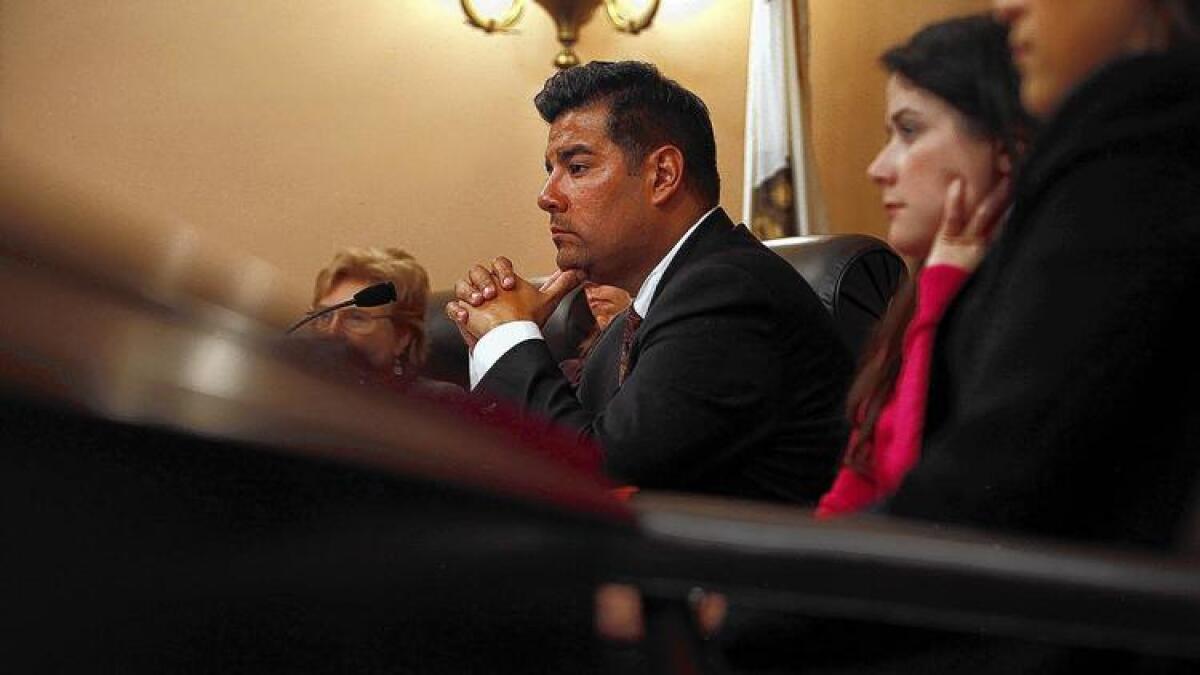
Dozens of faith-based colleges in California are objecting to legislation they say would infringe on religious freedom by allowing lawsuits from gay and transgender students who feel discriminated against because their sexual orientation conflicts with church tenets.
The dispute is a new slant on a debate that is roiling other parts of the country where states have sought to adopt so-called “religious freedom” laws, which allow businesses to decline service to same-sex couples if such service would violate their religious beliefs, or restrict the use of restrooms by transgender residents to facilities designated for the gender of their birth.
- Share via
Two weeks after California’s primary, Clinton’s lead over Sanders narrows slightly while many ballots remain
California election officials continued to count ballots on Tuesday, with the latest tally showing a slight narrowing in the Democratic presidential race and most of the uncounted votes cast as provisional ballots.
In all, more than 7.8 million ballots have been counted from the statewide primary that’s now two weeks in the rear-view mirror. A report published late Tuesday by Secretary of State Alex Padilla showed more than 784,000 ballots still had to be reviewed.
Tuesday’s vote count showed a slight narrowing of the lead for Hillary Clinton over Sen. Bernie Sanders. One week ago, Clinton was besting Sanders by 476,271 votes. As of Tuesday afternoon, that lead had shrunk by more than 29,000 votes to 446,987 votes.
Even so, Clinton’s statewide lead is more than 9 percentage points. Most of California’s Democratic delegates are awarded proportionally based on the vote totals in the state’s 53 congressional districts.
Eleven of California’s 58 counties have fully completed their vote tally.
Los Angeles County still has the largest single share of unprocessed ballots, and almost two-thirds of the state’s uncounted ballots as of Tuesday were cast provisionally -- when election officials couldn’t immediately confirm a voter’s registration details on election day.
Should all the outstanding ballots be deemed valid, statewide voter turnout on June 7 would be slightly above 48% of those registered. That would make the election California’s third-highest primary for turnout in the last two decades, behind the presidential primaries of 2008 and 2000.
- Share via
Bill requiring VA study of female veterans’ suicide prevention programs heads to President Obama
The U.S. Department of Veterans Affairs will have to look at whether its suicide prevention programs are meeting female veterans’ needs under a California-led bill that passed the House on Tuesday afternoon.
The House OKd the Female Veteran Suicide Prevention Act sponsored by Sen. Barbara Boxer (D-Calif.) by a voice vote. The measure had already passed the Senate and now heads to President Obama.
The VA already has to review its suicide prevention and mental health programs annually under the Clay Hunt SAV Act. The Female Veteran Suicide Prevention Act requires the VA to produce separate data and statistics on female veterans.
“The current rate of suicide among women veterans is heartbreaking and unacceptable,” Boxer said in a statement.
Rep. Julia Brownley (D-Westlake Village) sponsored the House version of the bill after learning that the rate of suicide among female veterans increased by 40% between 2000 and 2010.
“The Female Veteran Suicide Prevention Act will lead to a better understanding of the factors that contribute to the alarmingly high suicide rates among women veterans so that we can design more effective suicide prevention programs,” Brownley said in a statement.
- Share via
San Bernardino County could soon reclaim control of Ontario International Airport
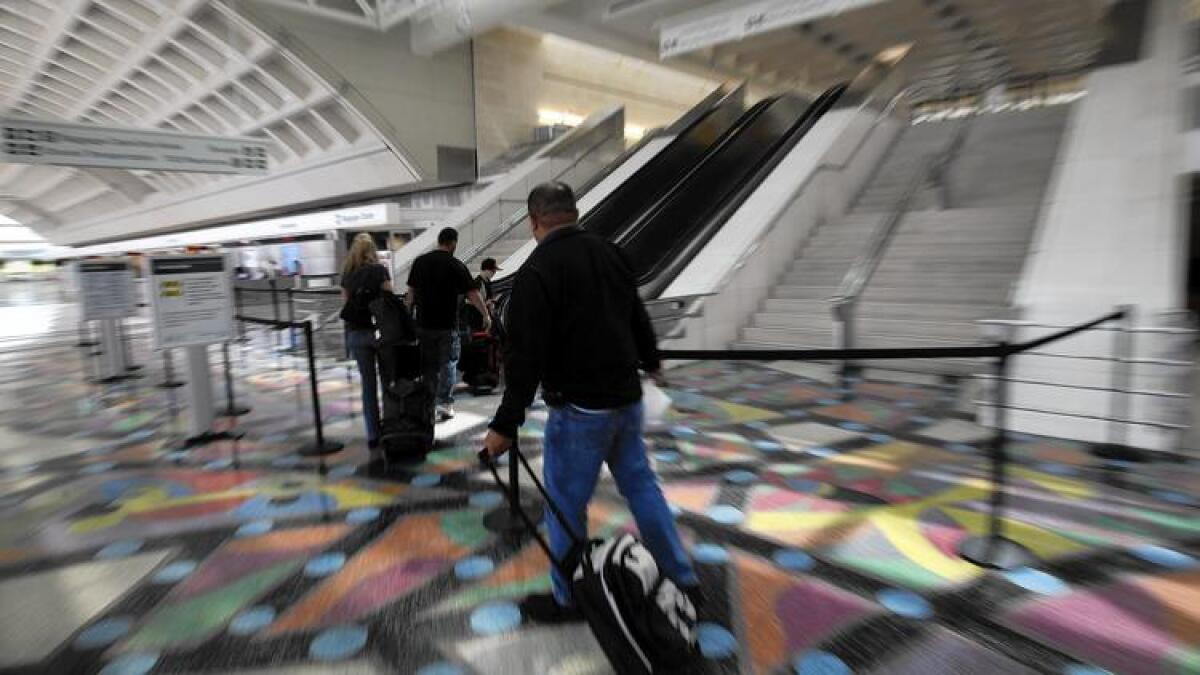
San Bernardino County and the city of Ontario could reclaim control of Ontario International Airport under legislation that passed the House by a voice vote Tuesday afternoon.
The legislation, H.R. 4369, allows some of the $2-per-passenger facility charge collected at the Ontario airport to be used at Los Angeles International Airport.
A stipulation of Los Angeles World Airports’ agreement to transfer Ontario International Airport to San Bernardino County and the city of Ontario last August was that the Ontario airport would reimburse LAX for millions in fees used to pay for new terminals in the 1990s. When both airports were owned by Los Angeles World Airports, the fees could be used that way.
The settlement agreement calls for $120 million in passenger facility charges collected at Ontario to go to LAX over the next 10 years. However, that isn’t allowed under current law.
The bill is just another step for the Inland Empire as it faces the substantial challenge of reviving the struggling facility that has lost more than a third of its passengers since 2007.
The bill’s lead sponsor, Rep. Ken Calvert (R-Corona), called the bill one of his highest priorities.
“Today is a great day for the Inland Empire and the future of air travel for our region,” he said in a statement.
The California members who sponsored the bill said local control of the airport is better for the community.
“Ontario International Airport is a major economic engine for our region in both trade and tourism, and giving local authorities control of the airport better allows them to meet the growing demand in San Bernardino County,” Rep. Ed Royce (R-Fullerton) said.
Rep. Mark Takano (D-Riverside) said in a statement that millions of passengers travel to LAX or other regional airports, and the local community is missing out on that money.
“As the Inland Empire continues to grow in population, the Ontario International Airport can be a vital economic resource to our region with the potential to serve 30 million passengers annually,” he said.
California Sens. Dianne Feinstein and Barbara Boxer have filed similar legislation in the Senate.
- Share via
The fight within the California Democratic Party over Uber and Lyft
The intense debate within California’s Democratic Party over Uber and Lyft was laid bare Tuesday morning when a bill that would ease regulations for ride-hailing companies from Assemblyman Evan Low (D-Campbell) advanced out a state Senate committee over the intense objection from committee Chairman Sen. Ben Hueso (D-San Diego).
Low’s bill would exempt ride-hailing drivers from having to purchase commercial license plates, a savings of up to $80 a year per driver depending on car size. He argued that Uber drivers pick up customers in the same car that they pick up their kids from school and shouldn’t have to pay the fee.
But Hueso saw the bill as just another attempt in the Legislature at undermining the taxi industry to pump up Uber and Lyft.
“You’re looking to give them an economic advantage in an environment where they have every single advantage given to them,” Hueso said.
He then ripped into Low for not exempting taxis from the same requirement and questioned why the state should forgo as much as $5 million in lost revenue from Uber and Lyft drivers.
“Why is it important, in your mind, that people engaged in commercial activity not have to pay a commercial fee?” Hueso asked.
This confrontation has been a long time coming. Low’s bill sailed through the Assembly last year with little opposition, but Hueso didn’t hold a hearing on it, preventing it from moving forward. Hueso is considered ride-hailing companies’ biggest opponent at the Capitol.
He also has worked in his family’s taxi business, and his brothers now own the largest cab company in San Diego. The Times and others have written extensively about Hueso’s taxi connections, and during the hearing, Hueso accused the ride-hailing industry of feeding the media stories.
The commercial license plate issue in particular has family ties. The company owned by Hueso’s brothers sued the state last year trying to force the Department of Motor Vehicles to require commercial plates for ride-hailing drivers. The case since has been dismissed.
Last week during a Senate floor debate on bills tied to the state budget, Hueso criticized Gov. Jerry Brown for supporting an exemption to ride-hailing drivers’ getting commercial plates.
“There isn’t a bill in support of [Uber and Lyft] that this governor won’t sign,” Hueso said during Tuesday’s hearing. “And there isn’t a bill that this Legislature won’t support.”
Aside from Hueso, two other Democrats, Sen. Fran Pavley of Agoura Hills and Sen. Connie Leyva of Chino, voted against the bill at the hearing.
Ride-hailing companies have had significant success in recent years in Sacramento because younger and Silicon Valley-area Democrats such as Low have aligned with the companies.
UPDATE 3:54 p.m.: This story has been updated to correctly identify Sen. Connie Leyva’s district.
- Share via
As ballots are counted, Hillary Clinton’s California lead shrinks
- Share via
Victims of Manson followers urge Gov. Jerry Brown to reject parole
The sister of Sharon Tate, the actress murdered by followers of Charles Manson during a brutal two-day rampage across Los Angeles in 1969, left Gov. Jerry Brown with copies of an online petition Monday signed by some 139,000 people.
The petition’s message is simple: Brown should deny parole to a former member of the Manson cult, Leslie Van Houten.
- Share via
Why is the military doing medical training on live animals? California lawmakers are asking.
Reps. Jackie Speier (D-Hillsborough) and Joe Heck (R-Nevada) and nearly 70 bipartisan members of the U.S. House want to know how the military plans to stop using live animals in medical combat-trauma training.
The Department of Defense began scaling back the use of pigs, goats, monkeys, chickens and other animals as part of its medical training in 2015. A letter from Speier and Heck, signed by the others, points to recent research by the Department of Defense that using simulated human tissue rather than live animals is cheaper and provides better training.
“The Department of Defense has the responsibility to provide the best available combat preparation to its medics. But according to its own studies, simulations are more effective than maiming and killing animals for medical training,” Speier said in a news release. “This is a no-brainer and we expect there will be no further delays in ending this barbaric practice.”
Eighteen California House members joined Speier, who serves on the House Armed Services Committee. Among them: House Foreign Affairs Committee Chairman Ed Royce (R-Fullerton) and several members on the influential Appropriations and Armed Services Committees.
The members are asking for specifics on the cost of using live animals versus using simulation-based teaching models, how many animals each military branch used for combat training in fiscal 2015, what regulations or policies still require the use of live tissue in training and what the department is doing to stop using live animals.
- Share via
Villaraigosa says a decision on the 2018 governor’s race is coming in November
Former Los Angeles Mayor Antonio Villaraigosa continued to stoke will-he-or-won’t-he speculation on running for governor of California in 2018, telling Fusion’s Jorge Ramos that he’d announce his decision after the presidential election in November.
“I think I’ve made it pretty clear what I want to do,” Villaraigosa said in the interview, conducted last week. “I’m going to work as hard as I can to stop [presumptive Republican presidential nominee Donald] Trump, to get Hillary Clinton elected. And then in November I’m going to make an announcement about my future.”
Villaraigosa also said he wasn’t interested in the vice presidential spot on Clinton’s ticket.
Should Villaraigosa run, he’d be the third high-profile Democrat in the race alongside Lt. Gov. Gavin Newsom and State Treasurer John Chiang. Check out our list of potential candidates here.
The full Villaraigosa interview is below.
- Share via
California’s top electricity regulator is lukewarm on measure to strip agency’s power
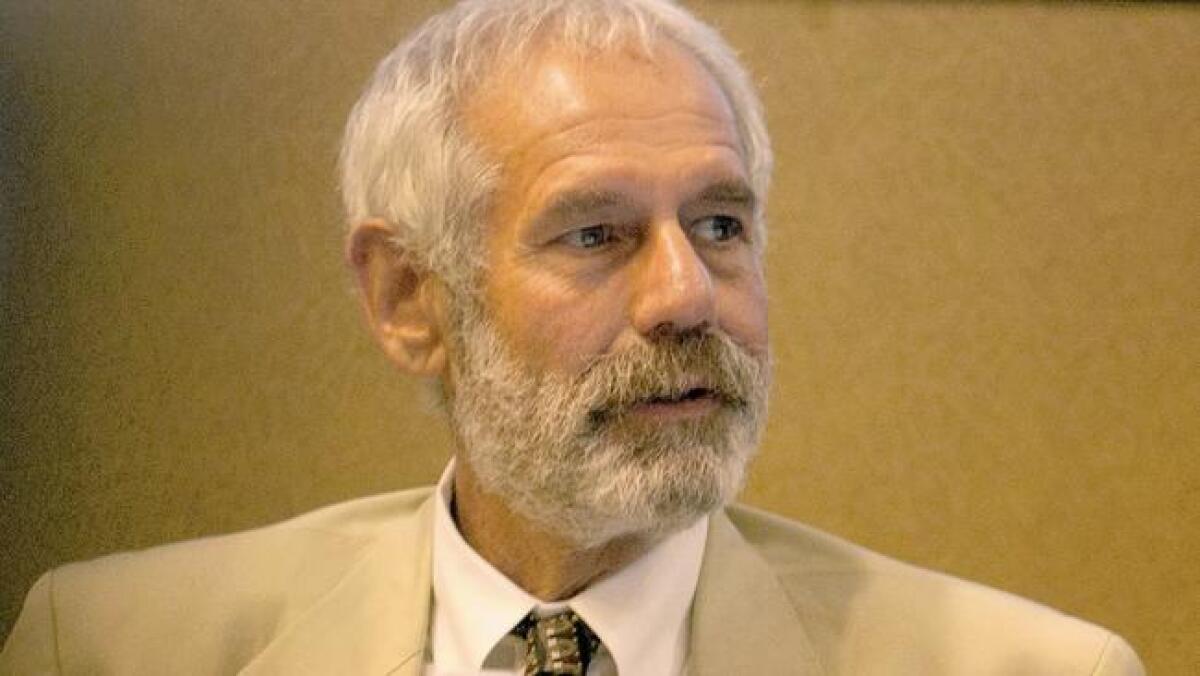
The head of the state agency in charge of regulating myriad utilities, including electricity and ride-sharing companies such as Uber and Lyft, lamented what he called an outdated system for protecting residents and ratepayers in a speech to the Sacramento Press Club on Monday.
But Michael Picker, who leads the California Public Utilities Commission, stopped short of endorsing a measure pending in the Legislature that would strip the agency of its power.
Picker said the agency’s structure, formed a century ago to regulate railroads, makes it difficult to adapt to technologies that are transforming electricity and other industries at a rapid pace.
“Particularly when they are so new, so innovative and changing so rapidly that nobody at the PUC understands them,” Picker told the press club.
But he was lukewarm on a constitutional amendment proposed by Assemblyman Mike Gatto (D-Glendale) that would dismantle the PUC and shift its responsibilities to other state agencies.
Lawmakers, Picker said, might not even want to take over responsibility for regulating issues like electricity because then they’ll get blamed for approving rate hikes.
Picker continued his pitch for someone else to handle regulation for Uber, Lyft and other ride-hailing services. The PUC was ill-prepared to take on the responsibility three years ago, he said, and remains understaffed when compared to the numbers of ride-hailing cars on the road.
“This is a crazy new market for a transportation service that doesn’t look exactly like anything that we’re doing,” he said.
Picker said he didn’t expect lawmakers to shift that responsibility to a different agency any time soon, noting a pending bill that would add statewide taxi cab regulation to the agency’s portfolio.
- Share via
The Dalai Lama arrives at the Capitol
- Share via
Braving the heat, the faithful wait for the Dalai Lama outside California’s Capitol
Families gathered with umbrellas, parasols and spray bottles filled with water on a sweltering afternoon as they waited more than an hour for the arrival of the world’s most famous monk.
Ahead of the Dalai Lama’s planned speech to the Legislature, children decked in traditional Tibetan dress waved flags and took photos with their friends on the lawn in front of the Capitol’s West Steps.
A lone protester shouted from a megaphone but was soon drowned out by shouts from the crowd and Tibetan music.
“We just want to welcome him because he is our leader,” said Tenzin Kusang, 8, who brought a bright Tibetan flag with her friends.
“It’s sort of like a once-in-a-lifetime chance,” added 13-year-old Tenzin Desel.
- Share via
On the Dalai Lama’s menu in Sacramento -- lunch with Jerry Brown

Before the Dalai Lama arrived at California’s Capitol on Monday, he met with Gov. Jerry Brown at a “small, private luncheon,” the governor’s office said.
The Tibetan leader is scheduled to deliver a speech to a joint session of the Legislature this afternoon. He’ll be greeted by Senate leader Kevin de León and Assembly Speaker Anthony Rendon on the Capitol steps.
The Dalai Lama spent Saturday in Orange County, where he visited a new Buddhist temple in the Little Saigon neighborhood.
- Share via
Dalai Lama due to arrive at the state Capitol soon
- Share via
Survey finds California voters opposed to legalizing Internet poker
A survey Monday commissioned by several Native American tribes with concerns about legalizing Internet poker in California found a majority of California’s likely voters oppose the idea.
Before hearing any arguments for or against, the survey found that 52 percent of likely voters oppose allowing online poker games, which is proposed by a poker legalization bill by Assemblyman Adam Gray (D-Merced). It would legalize and tax online poker in California.
When those surveyed were told Internet poker is illegal in the state but thousands of people still play it without consumer protection, 41% supported legalization and 51% opposed.
Some 74% of voters agreed that foreign websites that violated federal law by accepting U.S. users should be disqualified from getting a license in California.
The statewide telephone survey was conducted by the firm Fairbank, Maslin, Maullin, Metz & Associates on behalf of several tribes with opposition to legalizing Internet poker, including the Pechanga Band of Luiseño Indians, the Agua Caliente Band of Cahuilla Indians, the Barona Band of Mission Indians and the Lytton Rancheria Band of Pomo Indians.
“Voters are clearly skeptical about legalizing online poker,” said Pechanga Tribal Chairman Mark Macarro. “Even more toxic are provisions that would grant a license to foreign websites that illegally took bets from Californians in violation of federal law.”
The survey was released two days before a legislative fiscal committee is scheduled to consider the bill.
- Share via
Politics podcast: A new state budget, a familiar fight over gun control
On this week’s California Politics Podcast, we take a closer look at the newly approved state budget and its implications for some of this year’s most talked about debates when it comes to efforts aimed at the working poor.
We also discuss new tensions in gun control efforts both at the state Capitol and on this fall’s ballot in the wake of the mass shooting in Orlando, Fla.
I’m joined this week by Anthony York of the Grizzly Bear Project.
- Share via
Democrats back pot legalization, repeal of death penalty
The California Democratic Party on Sunday stayed true to its left-leaning political ideals, voting to support ballot initiatives to legalize pot and repeal the death penalty.
The party’s executive board voted to endorse the recently qualified November ballot measures during a weekend meeting in Long Beach. Delegates at the party’s convention in February already had voted to endorse initiatives to hike cigarette taxes, affirm a law banning plastic grocery bags and impose stricter gun control.
The only mild surprise was the party’s decision to take no position on an initiative by the Los Angeles-based AIDS Healthcare Foundation to bar the state from paying more for prescription drugs than the cost negotiated by the U.S. Department of Veterans Affairs. Drug companies have mounted an aggressive opposition campaign to the measure.
Among the measures supported by the party:
- Marijuana : The so-called Adult Use of Marijuana Act would legalize recreational pot use, allowing those 21 and older to possess and use up to an ounce. The measure would impose a 15% tax on retail sales of the drug and require the state to regulate the cultivation, distribution and sale of recreational marijuana.
- Death penalty : A measure that would eliminate death sentences and replace them with a sentence of life without parole.
- Citizens United: A symbolic measure that asks voters whether lawmakers should attempt to overturn the 2010 U.S. Supreme Court decision in Citizens United vs. the Federal Election Commission. The ruling in favor of a conservative nonprofit group opened the door to unlimited spending by corporations and unions in federal candidate campaigns. The measure carries no force of law.
Among the initiatives opposed by the party’s executive board:
- Condoms: An initiative that would require porn actors to wear condoms.
- Death penalty: The measure expedites appeals of death row inmates, with the intent of speeding up executions.
- Share via
Bill to expand overtime rules for farmworkers is resurrected in the Legislature
Two weeks after lawmakers rejected the proposal, an effort to create new overtime pay rules for California farmworkers has reappeared in the Legislature.
Assemblywoman Lorena Gonzalez (D-San Diego) replaced the contents of an unrelated bill last week with language on overtime work rules.
On June 2, Gonzalez’s original attempt fell three votes short after an emotional floor debate in the Assembly. Several of her fellow Democrats either voted against the bill or abstained.
Like the first version, AB 1066 would phase in new overtime pay requirements for agricultural workers over a four-year period beginning in 2019. Supporters of the effort have argued that existing overtime allowances for farmworkers are too limited compared with other jobs.
By 2022, the bill would require overtime pay for farm labor longer than eight hours in a single day or 40 hours in a single week. In that same year, the bill would require double-time pay for any work over 12 hours.
- Share via
The Dalai Lama will speak to a joint session of the Legislature on Monday
As part of a trip through California, the Dalai Lama will address a joint session of the Legislature on Monday.
The speech, said legislative staffers, will touch on the environment, compassion and ethical leadership.
The Tibetan Buddhist leader’s visit to Sacramento comes on the heels of a sermon on Saturday in Orange County’s Little Saigon community.
Legislative leaders will formally greet the 14th Dalai Lama upon his arrival at the state Capitol. The speech to the Legislature is scheduled to begin at 1 p.m.
- Share via
Measure to repeal California’s death penalty qualifies for the November ballot
California voters will be asked this fall whether to repeal the state’s 38-year-old death penalty, as elections officials announced Friday that an initiative to abolish the law has earned a spot on the Nov. 8 ballot.
Backers of the initiative gathered almost 405,000 voter signatures, according to the final tally conducted by county elections officials.
The initiative, championed by former “M*A*S*H” actor Mike Farrell, would eliminate the death penalty for first-degree murder. The most serious punishment would become life in prison without the possibility of parole.
That would include the 743 inmates now on death row, the largest condemned population of any U.S. state and one beset with cases of extreme mental illness.
“Whether you look at the death penalty from a taxpayer, a criminal justice or a civil rights perspective, what is clear is that it fails in every respect,” said Farrell in a written statement Friday evening. “We have to do better in California.”
Only 13 inmates have been executed since the current law was enacted in 1978, with none in the last decade after legal challenges against the execution drugs administered by prison officials.
The initiative would require mandatory work while behind bars for those convicted of murder, with wages going to debts owed to crime victims.
The independent Legislative Analyst’s Office has estimated that in the long run, the ballot measure would reduce state government expenses by as much as $150 million a year, due the elimination of legal challenges to death sentences.
A similar ballot measure, Proposition 34, was defeated by voters in 2012. A pro-death penalty initiative may also appear on the November ballot, after supporters also turned in signatures last month.
November’s field of statewide propositions will probably produce the longest statewide ballot since March 2000. Besides the two death penalty measures, voter signatures on eight other initiatives are now being checked. The deadline for Secretary of State Alex Padilla to certify the list of ballot measures is June 30.
UPDATE 7:52 p.m. This story has been updated to include a comment from Mike Farrell.
- Share via
California leaders get an “incomplete” on budget report card
California lawmakers approved a new budget this week, sending it to Gov. Jerry Brown for his signature. But just like every year, there are some issues that were left unresolved.
Here’s a look at what got done and what’s been left for later.
- Share via
Judge allows a Santa Cruz voter’s Bernie Sanders ballot to count, after mistaken registration as an American Independent
A Santa Cruz County judge ruled that a voter could change her registration status and have her ballot be counted in the Democratic presidential primary after she petitioned that she had mistakenly registered with California’s American Independent Party.
“This election, to me, is so important,” said Judith Webb, a Santa Cruz resident who won her case in court Wednesday.
Webb, 60, said she had assumed she was an “independent” voter until a friend pointed out the Los Angeles Times investigation of widespread confusion between being unaffiliated with any party and the minor, ultraconservative American Independent Party.
Unaffiliated voters, formally known in California as having “no party preference,” were allowed on June 7 to cross over and cast a ballot in the Democratic presidential race between Hillary Clinton and Vermont Sen. Bernie Sanders. But AIP voters were not allowed to participate.
Webb, a Sanders supporter, discovered her error after the May 23 voter registration deadline.
“I was looking for my presidential candidate who wasn’t on there,” she said in a phone interview on Friday.
Santa Clara County Dist. Judge John Gallagher, in a brief hearing, ordered elections officials to change Webb’s voter registration status to “no party preference” and count her June 7 primary ballot.
“He congratulated me on my effort,” said Webb of the judge’s reaction.
Gail Pellerin, Santa Cruz County’s registrar of voters, said her staff often helps people navigate the judicial process if a registration error is discovered. She did not object to the judge’s ruling.
“I’m not going to oppose counting someone’s vote,” Pellerin said.
An exclusive poll conducted as part of the Times investigation found that 73% of AIP voters who were surveyed had no idea they were a member of a political party.
“As I’m talking around to people, there are more people in the same position,” she said.
- Share via
Wife of assemblyman accused of domestic violence testifies she is ‘afraid’ his election loss will prompt retaliation
Baldwin Park City Councilwoman Susan Rubio said in court Thursday she is fearful her husband, Assemblyman Roger Hernández, will retaliate against her because of his poor showing in the state’s primary election.
Rubio is seeking a domestic violence restraining order against Hernández, a Democrat from West Covina. The assemblyman was dogged by allegations that he repeatedly beat his estranged wife as he ran for Congress.
Testifying Thursday, Rubio said she was afraid of what might happen to her in the future if Hernández is eliminated in the primary.
“I’m afraid he is going to blame it on me and try to retaliate,” she said while testifying.
Rep. Grace Napolitano (D-Norwalk) has won 51% of the votes cast in the June 7 primary. Hernández is currently 1,178 votes behind behind first-time Republican candidate Gordon E. Fisher in the race for second place. The top two finishers, regardless of party, advance to a November runoff against the congresswoman, who is favored to win reelection.
The Los Angeles County race is still listed as a close contest by California’s Secretary of State.
Rubio alleged in an April court declaration seeking a restraining order that Hernández had shoved, hit and choked her repeatedly since they were married in 2013.
At a hearing in May she made new allegations, saying he had beat her with a broom and threatened her with a knife during their marriage.
Hernández denied Rubio’s allegations in a May 3 court declaration, saying he “would never engage in the type of conduct respondent has accused me of committing.”
Hernández testified Thursday that Rubio had “fabricated” the allegations against him.
He said the couple had arguments where they would yell at each other, but that he never hit his wife.
“There were times when she exaggerated events,” he said.
At one point, Rubio’s attorney, Crystal Boultinghouse, took an overtly political line of questioning, asking Hernández if he thought Rubio’s allegations were the “No. 1” reason for his election results.
He said the accusations against him played a “significant role” in the vote tally. He said “just about every attack” against him in the election was based on Rubio’s allegations.
Boultinghouse continued asking him about the election and held up a political mailer sent out by Napolitano’s campaign that included Rubio’s allegations and information about another woman who obtained a restraining order against him in 2012.
Judge Shelley Kaufman became frustrated with the questioning.
“I don’t know where we are going with this at all,” Kaufman said.
Rubio filled a declaration seeking the order after an April 5 divorce hearing at which she said Hernández came “aggressively” toward her and began shouting in her face. She said in her declaration the incident gave her “flashbacks” of previous violence during their marriage, so she decided to seek the restraining order.
Though she did not mention it in her declaration, Rubio testified earlier this month that Hernández approached her during the hallway incident and told her “you haven’t seen the wrath of me yet.”
Hernández disputed Rubio’s version of events after the hearing.
He said he approached her in a “calm” and “peaceful” demeanor.
“I was diplomatic,” he said. “I was soft-spoken.”
The hearing continues Friday.
- Share via
Don’t look for me on Hillary Clinton’s ticket, L.A. Mayor Eric Garcetti says
Eric Garcetti wants to stay mayor of Los Angeles rather than join Hillary Clinton as vice president, he told KNX Newsradio on Thursday.
“I’m not looking for a new job,” he said. “I have a great one right now, and that’s being mayor of the city.”
Garcetti’s name was floated as a potential running mate for Clinton in a recent Wall Street Journal article.
He endorsed Clinton and campaigned with her during the California primary. He’s also planning to run for reelection next year and could also mount a bid for governor in 2018.
- Share via
New ad for California gun control campaign focuses on deadly Orlando rampage and other mass shootings
The campaign behind Lt. Gov. Gavin Newsom’s proposed ballot initiative to toughen California’s gun laws released a video Thursday focused on the deadly assault that left 49 dead at an Orlando nightclub Sunday and other mass shootings in the U.S.
The video, which is running only online and through social media outlets, includes news footage from shootings in Sandy Hook, Columbine, Virginia Tech and San Bernardino.
As the images appear on the screen, Newsom urges voters to support the November ballot initiative and take on the National Rifle Assn., saying “we are not innocent bystanders.”
“And I’ll say this to the NRA: You can intimidate politicians, we’ve seen that. Hell, you’ve been effective. But you can’t intimidate the public,” he says.
Newsom’s proposed initiative, called the Safety for All Act, would require background checks for ammunition purchases and ban possession of large-capacity magazines.
A package of bills that would impose similar new gun restrictions is currently winding its way through the California Legislature.
A coalition of gun rights advocates also recently produced videos opposing Newsom’s measure.
One of them shows a woman pulling out a gun as a man attacks her in a dark parking garage — but there are no bullets in her gun. The video ends with the message: “Take away our rights. Take away our life.”
That video also appears online and on social media sites.
- Share via
California’s new motor voter law could add 2 million registered voters in its first year, study says
A new study from the Public Policy Institute of California estimates that, if executed successfully, the state’s new motor voter law could add more than 2 million new voters to the rolls in its first year of implementation.
The new law, slated to take effect next year, is supposed to streamline the way citizens register to vote at Department of Motor Vehicles offices. Once fully implemented, drivers applying for or renewing licenses and completing other DMV transactions will have their information electronically transmitted to the secretary of State, as long as they’ve confirmed they’re eligible to vote and don’t opt out of registering.
State officials have been saying for months that potentially millions of new voters could be registered under the new law. The PPIC report released Thursday appears to bolster that claim.
If the law is a success, the report says, California’s electorate could grow to include more Latinos, young people and those with foreign-born parents and lower education levels.
The share of voters who have not attended college could increase by more than 6 percentage points, for example, and the share of Latino voters in the electorate could jump from 23.8% to 27.8%, PPIC found.
Much of that depends on how the secretary of state and DMV roll the program out, the report states.
For example, voters registering at the DMV as of April 1 have been using a new protocol that helps automate the process but requires registrants to go to a separate room to answer key questions about party preference and language preference on a touch-screen terminal.
As many as a third of people registering to vote at DMV offices statewide have walked out before completing this crucial step, officials have said. That has led to criticism from voter advocates who say the two-step process could confuse voters and lead to complications in voting.
- Share via
California lawmakers create a University of California research center on gun violence
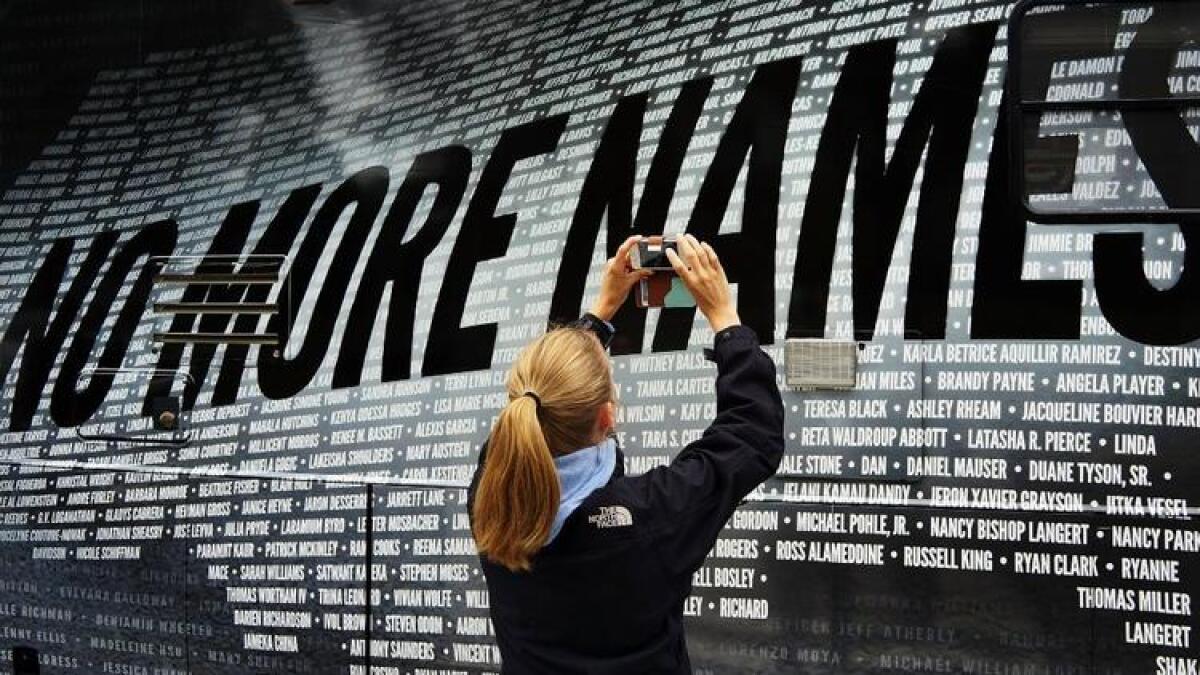
Legislators on Thursday approved $5 million for the creation of a new research center on firearm violence, with supporters saying it will provide statistically sound data on the effectiveness of existing gun laws.
“It is a big step for us, frankly, and for the country to step in where Congress has failed,” said state Sen. Lois Wolk (D-Davis) during floor debate.
The proposal was contained in one of the “trailer” bills that implements the new state budget approved on Wednesday. Lawmakers aren’t expected to wrap up their work on the implementation bills until next week.
The effort began as a standalone piece of legislation earlier this year but was ultimately tucked into the final budget agreement between legislative leaders and Gov. Jerry Brown.
Federal research into gun violence has largely been dormant for two decades, the result of lobbying by the National Rifle Assn. to curb the use of federal dollars. The organization also opposed the California effort, arguing it would use taxpayer dollars to fund a political agenda.
The budget bill that contains the gun violence center received a few Republican votes on Thursday in Sacramento.
Lawmakers have pointed out that California bears the brunt of significant costs from gun-related violence. A 2013 state agency report concluded that government-sponsored insurance programs pay for some two-thirds of the cost of firearm assaults and about half the cost of unintentional or self-inflicted gun injuries.
On Monday, a package of bills that would impose new gun restrictions cleared a major hurdle in the state Capitol after emotional testimony from both gun control and gun rights groups. That vote came just two days after the mass shooting in Orlando, Fla., that left 49 people dead.
That incident “underscores our need to better understand the impact of firearm violence,” said UC spokesperson Claire Doan. She said location and further funding for the research center are still to be determined.
The language of the budget-related bill says that there’s a lack of objective data on the impact of gun violence, a void that the UC center would fill.
The proposal would ask the UC center to focus on both the causes and consequences of gun violence as well as the effectiveness of existing laws. The $5 million appropriation was designed to provide funding for the gun violence center’s first five years of operation.
UPDATE 1:09 p.m. This story has been updated with additional information.
12:55 p.m. This story has been updated to reflect the vote took place on Thursday, not Friday.
10:57 a.m. This story has been updated with additional information on the budget proposal.
- Share via
Clean car programs running out of cash in California
As California lawmakers put the final touches on the state budget, one thing that won’t be included is any money for subsidizing the purchase of clean cars.
The funding has been the victim of a political impasse over the future of the state’s climate change agenda. It’s a setback for getting more zero-emission vehicles on the road, an important step for reaching California’s environmental goals.
- Share via
State lawmakers convene to continue work on budget-related bills
- Share via
Gov. Brown congratulates lawmakers as they pass the state budget
- Share via
California Legislature approves $171-billion budget
With concerns about the potential for another recession casting a shadow over this year’s budget negotiations, California lawmakers today sent to Gov. Jerry Brown a new $170.9-billion spending plan.
It increases some funding for social services but stashes more away in a rainy-day fund.
- Share via
And now the Senate approves the budget. Next stop is Jerry Brown’s desk.
- Share via
Assembly approves budget -- now it’s the Senate’s turn
- Share via
Lawmakers offer views, split by party, on new California state budget
- Share via
Budget debate gets going
- Share via
Los Angeles County’s quest for a milionaires’ tax to help the homeless is ‘premature,’ says Senate leader
In perhaps the most clear signal yet of the long odds facing Los Angeles leaders, Senate leader Kevin de León declined on Wednesday to endorse a local income tax on millionaires for funding homeless prevention programs.
“It’s premature, because if the governor is not on board, then it’s all for naught,” said the Los Angeles Democrat during a state budget discussion with reporters.
De León and his Democratic colleagues convinced Gov. Jerry Brown to embrace a $2-billion statewide bond for housing the homeless who suffer from mental illness. That proposal will be considered by both houses of the Legislature on Thursday.
Last week, Los Angeles County Supervisor Mark Ridley-Thomas met with the governor as part of a Sacramento visit to make the case in person for a local tax on incomes above $1 million with proceeds earmarked for homeless programs.
The challenge is whether a green light for Los Angeles would lead to other counties also wanting to impose their own local income taxes.
De León also said on Wednesday that the idea could lead to other efforts that might undermine the power, and relevance, of state lawmakers.
“You start diffusing and decentralizing one’s responsibility in the state Capitol and then it makes you wonder,” he said.
- Share via
Gov. Jerry Brown wants to extend California’s climate change law beyond 2020
Gov. Jerry Brown is endorsing an extension of the state’s main climate change law.
“We will not meet our world-leading clean air and emission reduction targets unless we solidify and redouble our commitment to the state’s cap-and-trade program and climate goals beyond 2020, and we will work hard to get that done,” Brown spokeswoman Deborah Hoffman told The Times.
The state’s climate program has been beset by political, legal and financial problems and AB 32, the landmark 2006 legislation that established the state’s cap-and-trade program alongside dramatic targets for reducing greenhouse gas emissions, only runs through 2020.
Previously, Brown has extended the greenhouse gas reduction targets through executive orders.
State Sen. Fran Pavley (D-Agoura Hills), who authored AB 32, has pushed for new legislation to force lawmakers to show their support for the state’s climate change goals before the legislative session ends in August.
Any deal might require a two-thirds vote to bulletproof the new law from legal challenges over revenue generated through the cap-and-trade program.
- Share via
It’s budget day in California’s Capitol
Lawmakers are meeting Wednesday to approve the next state budget, hitting their deadline for a new spending plan.
The proposal includes $170.9 billion in state spending, which includes the general fund, dedicated funds and bond money.
The Assembly and the state Senate are each scheduled to start their floor sessions at 3 p.m.
To catch you up to speed, the final budget deal includes extra money for the state’s rainy-day fund, as well as new funding for child care and welfare.
The Legislative Women’s Caucus scored some significant victories this year.
The budget deal would remove detailed transparency requirements for a new accounting system.
Gov. Jerry Brown backed a $2 billion bond to help the homeless earlier this year.
Legislative analysts said it was a good idea for the state to stockpile more money in reserve to guard against an economic downturn.
- Share via
Congressman gets military promotion
- Share via
There soon could be a new ‘unknown’ voter category in California
As part of the budget deal expected to be passed by the end of this week, California will create a new category to describe voters, in addition to the eight existing options that exist, including Libertarian, the state’s American Independent Party and No Party Preference.
The new category will label voters as having an “Unknown” party preference and would apply mostly to voters registering at the Department of Motor Vehicles, where a new voter registration process recently was implemented.
As many as one-third of voters registering at the DMV since the program began April 1 have walked out without completing important questions about their party preference, language preference or vote-by-mail status. All of those questions must now be answered on separate, touch-screen terminals in another room.
While they are still registered to vote, their party currently defaults to “No Party Preference,” a designation that accounts for almost 1 in every 4 California voters.
Starting next year, when the state’s new motor-voter law goes into effect, those voters instead will be labeled as “Unknown.” State officials have said that law, which was signed by Gov. Jerry Brown last year, is expected to ultimately enroll millions of new voters.
But with the DMV already registering tens of thousands of voters under its new protocol, and with a sizable portion of voters walking out before completing all of the steps, this week’s budget agreement seeks to bridge the gap until the law takes effect.
“Unknown” voters, by law, wouldn’t be counted as part of the total number of registered voters for the purpose of determining a party’s ballot eligibility.
So why make the distinction? A handful of people close to the negotiations around last year’s motor-voter law said that at least part of it was politics, and that the change was made after top-level negotiations among legislative leaders in the final days before the bill’s passage.
Paul Mitchell, vice president of Political Data Inc. which sells voter data to campaigns and their consultants, says he sees the “Unknown” voter category as a way for Democrats and Republicans to fight the perception that more voters are rejecting parties altogether.
“The consolation prize is that, yes, the train is headed in the direction where people are going to be registering in greater numbers without a party ... but we’ll allow you to call them something different for the sake of face-saving in the future,” he said.
Mitchell says distinguishing between a voter who purposefully chose not to be affiliated with any party and one who might have overlooked that step can be valuable for purposes of voter targeting, particularly if the person is a new voter with little to no past political activity from which to draw.
“There were a lot of campaign consultants concerned about the harm that it would do to their targeting, the inability for them to be able to identify the right voters,” if unaffiliated voters were lumped in with those who simply didn’t complete the DMV’s two-step process.
- Share via
One week later, almost 2 million California primary ballots still must be reviewed
Elections officials across California continue to work through a stack of unprocessed ballots, now totaling more than 1.9 million potential votes in last week’s local and statewide races.
About 60% of the unprocessed ballots are in just a half dozen counties. By law, local officials have another three weeks to count votes, a process slowed down in part by the large number of ballots cast by mail.
This is also the first year for a new state law allowing any ballot received 72 hours after election day to be counted, as long as it was postmarked in time.
The latest results haven’t changed any of the statewide races. In the closely watched Democratic presidential primary, Hillary Clinton’s lead over Vermont Sen. Bernie Sanders stands at more than 11 percentage points. That’s largely the same gap that existed between Clinton and Sanders on election night.
Los Angeles County, the state’s most populous, still has 556,319 ballots to review. Many of them are provisional ballots, designed to be cast when there are questions on election day about a voter’s registration status.
Dean Logan, the county’s clerk-registrar of voters, acknowledged on Tuesday that there had been some problems on June 7 and that some of them were caused by confusion over the differing rules for the presidential and statewide primary races.
San Diego County and Riverside County, respectively, still have the second and third largest number of ballots to be reviewed.
Should all of the unprocessed ballots be counted, statewide voter turnout in the closely watched primary would be about 51% of those registered. That would rank behind voter turnout in the 2000 and 2008 presidential primaries, the last two with open races in both major political parties.
State election law allows counties 30 days to finish the processing of ballots and their final count of votes cast.